
The Project Gutenberg EBook of The Children's Longfellow, by Doris Hayman
This eBook is for the use of anyone anywhere at no cost and with
almost no restrictions whatsoever. You may copy it, give it away or
re-use it under the terms of the Project Gutenberg License included
with this eBook or online at www.gutenberg.org
Title: The Children's Longfellow
Told in Prose
Author: Doris Hayman
Release Date: March 18, 2009 [EBook #28352]
Language: English
Character set encoding: ISO-8859-1
*** START OF THIS PROJECT GUTENBERG EBOOK THE CHILDREN'S LONGFELLOW ***
Produced by Sankar Viswanathan, D Alexander, Juliet
Sutherland, and the Online Distributed Proofreading Team
at http://www.pgdp.net


he home of the American poet, Henry Wadsworth Longfellow, during the greater part of his life was in the picturesque town of Cambridge, Massachusetts, and there many of his best known poems were written.
The forge of the Village Blacksmith really stood there beneath the shelter of a "spreading chestnut tree," in Cambridge, and when, as the town grew larger, the smithy was removed and the tree cut down, all the school children in Cambridge subscribed together to buy the wood of the famous tree and had a chair made from it which they gave to the poet.
Longfellow was deeply interested in all Indian lore, and in the poem of Hiawatha he has embodied many of the old legends of the North American Indians. Hiawatha, who was known among the different tribes under various names, was supposed to be a person of miraculous birth, sent among them by the Great Spirit to clear their rivers and forests and to teach them the arts of peace.
In the Golden Legend we find quite a different form of story. This is a [2]legend written down by one of the old German Minnesinger and called, "Der arme Heinrich" (Unhappy Henry). The American poet has faithfully followed the outlines of the story, but has added a good deal to it, including the appearance of Lucifer with his train of evil spirits, and his attempts to lead Prince Henry astray.
Five of the remaining stories are taken from the "Tales of a Wayside Inn"—a series of poems whose plan was evidently suggested by the Canterbury Tales.
Doris Hayman.
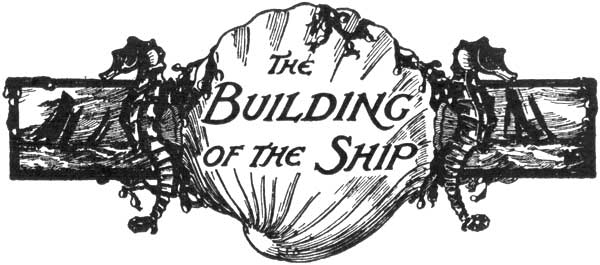
t was in bygone days, long before the use of steam was even thought about; trains were unknown, and when people wished to get from one part of the country to another they were obliged to make the journey on horseback or in coaches, and distances, which nowadays we can cover in a few hours, used to take our ancestors several days. It was the same thing in regard to journeys by sea. To cross the Atlantic, for instance, by an old-fashioned sailing vessel was a far more venturesome undertaking than it is to step aboard one of the great ocean liners and be conveyed swiftly and safely to one's destination. A sailing ship ran far greater risks of being wrecked by storms, and, if the winds were unfavorable, she would toss about for weeks, perhaps even for months, instead of being able to make straight for her port. And yet there was a charm about a sailing ship which no[4] steamer with all its complicated machinery can replace, and in the good old days we hear of men who have weathered storms as violent and sailed on voyages quite as perilous as any which have been undertaken since.
Well, it happened in the times of which we are speaking, that a wealthy merchant in the New Country came to a great ship-builder, who was known to all by the name of the Master, and bade him build a strong and goodly ship.
"It must be beautiful to behold," said the merchant, "and yet strong enough to wrestle with wind and storm."
The Master was delighted to receive this commission, for his heart was in his work and he felt that here was a chance to build a ship worthy of his reputation, so he answered joyfully: "Before long we will launch as goodly and strong a vessel as ever weathered a wintry gale."
At these words the merchant departed content, because he knew that whatever the Master promised he would surely fulfill.
The Master made no delay but set to work at once on a little model of the ship, making it perfect in every part, so that when the great ship came to be built he would have every detail already clear before him. As he labored, his mind was busy recalling all the famous ships which had been built before this one. A picture[5] of one of the most renowned, the Great Harry, was hanging on the wall before him. It was a strange sight, with its cumbersome form, its bow and stern raised high and its eight round towers like those of some old castle. The Master smiled as he looked on it and murmured to himself: "Our ship shall be of another form to this." And when the model was finished, it was indeed of a very different build. She was a beautiful little vessel built for freight and yet for speed; broad in the beam so as to resist storm, but tapering off at the bow and stern so that the force of the waves might drive her on instead of checking her course. When the model was quite finished, the Master carried it down to the ship-yard and looked round searchingly to see that all the necessary preparations had been made. Gigantic heaps of timber lay piled in the ship-yard; there were beams of chestnut, elm, and oak, and, scattered among them, cedar wood brought from regions far away. Every country, every soil must send its tribute and help to build the wooden walls of each ship that is launched.
The sun was rising when the Master came down to the ship-yard; with him was a young man, who stood leaning against an anchor and who listened eagerly to every word which fell from the Master's lips. These two were alone and the old man's speech flowed on, interrupted by nothing but the waves[6] which broke in long ripples on the pebbly shore. This young man had for a long time been a pupil and worker of the master; though his years were fewer, his brain was as quick, his hands as dexterous as those of the elder man, and to him was now entrusted the important task of building and launching the ship on the lines that the Master had planned.
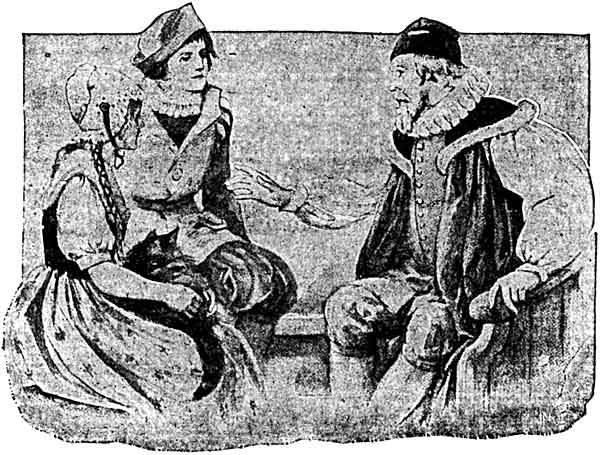
"We will build the ship thus," said the old man. "Lay the blocks of wood on the slip, following my plans closely, and be sure to choose the timber with the greatest care; the framework is to be of cedar and pine and every inch of wood must be sound. When the ship is finished she shall be named Union, and[7] the day she is launched my daughter shall become your bride."
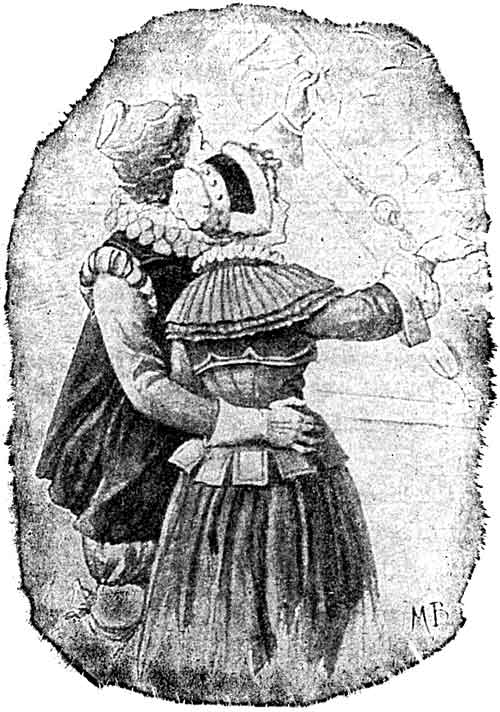
Joy filled the youth's heart, and, turning his head, he caught sight of the maiden standing before her father's door. Young and fair was the Master's daughter, with golden hair and sparkling eyes, and,[8] as he gazed at her, he felt that no task could be too difficult for him to accomplish, since he had the promise of a reward so fair as this. Love is a splendid master; no task seems too difficult when love fills the heart and guides the hand, and he who is urged by love far outstrips all others.
And thus it was with this youth; love of his bride and love of his work made him strong and skillful, and, so impatient was he to see the completion of the ship, that he summoned his workmen and set about his noble task without an instant's delay. Soon the sound of axes and mallets plied by sturdy arms was heard on all sides of the ship-yard. Before the shadows of evening fell, the oaken keel of a noble ship was lying ready stretched along the blocks. The work was well begun and all seemed to promise fair for a happy ending.
When the long hot day was over, the young man and his promised bride sat before the door of the Master's house while the old man rested within the sheltered porch and recounted tales of wrecks which had taken place at the time of the great September gales, and of pirates who had made the Spanish seas a place of danger for harmless merchant ships; then he spoke of ships which had sailed for distant shores but had never returned, and of the chances and changes of a sailor's life. The Master himself had sailed to[9] many far-off lands and he told his attentive listeners of their wondrous charm; of their palms and shining sands, the coral reefs and the dark-skinned natives who dwelt there in savage freedom. And, as he related these tales of the dark and cruel sea, which, like death, unites man to his fellows and yet holds them far asunder, the maiden held her breath and clung to her lover, dreading the days when perchance they too might be divided by the pitiless ocean. The three sat for a while in thoughtful silence as the darkness deepened around them, broken only from time to time by the fitful gleam of the old man's pipe.
Work was resumed afresh the next morning, and the vessel grew day by day till at length a skeleton ship rose to view. Weeks passed on and the ship made rapid progress till the whole hulk stood ready. Then a great cauldron was heated, and the bubbling tar within was used to smear over the planks and thus sheathe the ship.
The rudder of oak banded with copper, which was to control the whole vessel, lay ready on the sand, and near it the anchor, whose mighty grip was to hold the great ship secure against raging storms. The figure-head was in the shape of a maiden clad in white robes which seemed to be fluttering in the wind; a great artist had carved it in wood and had taken the Master's daughter as his model. In after days many a signal[10] light was flashed on to her, and her graceful form became well known to those who watched as the ship sped by through the dark and rainy nights.
In the forests near the snow-covered mountains and plains, majestic pine trees were hewn down and dragged by oxen along the winding road to the shore. Here they were stripped of their branches and bark and used for the tall and tapering masts of the noble ship. Only the roar of the wind and waves would remind them of their native forests which they would never see again. When the masts were swung into place, they were made fast with shrouds and stays; and finally a flag of red, white, and blue was unfurled at the masthead and displayed its stars and stripes to an admiring throng.
At length there came the day of the double bridal—that of the gray old sea to the ship, and the wedding of the young master and his bride. The Union was decked out with gay flags and streamers, and the bridal party came on board. The service was read and the Master, with tears in his eyes, shook the brown hand of his son and kissed his daughter's fair cheek. The worthy pastor spoke kindly words of warning and cheer to the young couple and bade them Godspeed on their journey through life.
Then the Master waved his hand, and, at this signal, there was heard all around the noise of hammers knock[11]ing away the vessel's supports. Suddenly the ship moved, a thrill seemed to run all through her frame, and with a sudden leap she bounded into the ocean. Loud shouts and cheers uprose from the crowds assembled on the beach, and the staunch ship Union sailed gayly forth on her first voyage.
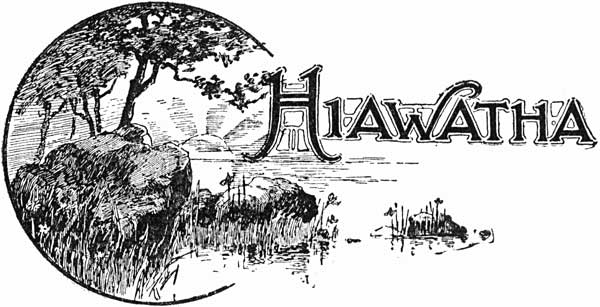
ong, long ago, in days that are now forgotten, the West-Wind wooed a lovely Indian maiden, but soon, cruelly and faithlessly, he deserted her and she died of grief, leaving her baby son, Hiawatha, to the care of his grandmother, old Nokomis.
Deep in the forest was Hiawatha's home, and Nature herself was his schoolmistress. He learned all about the birds, how they built their nests in summer, and where they hid themselves in winter, the names and habits of all the wild beasts which roamed through the woods, and, best of all, he learned their language and all their secrets.
Skilled in the craft of Indian hunters, and all the lore the wise men of his tribe could teach him, Hiawatha grew from childhood into manhood, and by much questioning learned from old Nokomis the story[13] of his mother's cruel desertion. Full of wrath, he determined to be revenged on his father, Mudjekeewis, and in spite of his grandmother's warnings, the youth set out on his long journey. Wearing his magic moccasins (or deerskin shoes), with which he measured a mile every stride, Hiawatha journeyed westward, ever westward, until at length he reached the kingdom of Mudjekeewis, ruler of all the winds of heaven, who joyfully welcomed the handsome youth. But anger rose in the heart of Hiawatha, and, rending asunder a huge rock with his magic mittens, he flung the fragments full at Mudjekeewis. For three days a terrible fight raged between the two warriors, till at last Mudjekeewis cried: "Hold, my son, it is impossible to kill me for I am immortal; I did but fight with you to test your valor. Go back now to your people; live with them, work with them, and free the land from all monsters and giants. And when Death at last lays his icy hand upon you, you shall share my kingdom and be ruler of the Northwest-Wind." Then all anger departed from Hiawatha and he went on his homeward way; only once did he turn aside, to buy arrow-heads from the ancient arrow-maker in the land of a neighboring Indian tribe. But do you not think that arrow-heads could equally well have been bought in his own village? It was to see the arrow-maker's dark-eyed daughter, Minnehaha, that Hiawatha halted in the land[14] of the Dacotahs, and when he reached home he told Nokomis of the meeting with his father and the great fight, but not a word did he say of arrows or of the maiden.
Hiawatha had two beloved friends, the sweet-voiced singer, Chibiabos, and Kwasind, strongest of all men. Even the birds could not sing so sweetly or the brooks murmur so gently as Chibiabos, and all the hearts of men were softened by the pathos of his music. But dear as he was to Hiawatha, no less dear was Kwasind. Idle and dreamy was Kwasind so that even his mother taunted him. "Lazy Kwasind," said she one winter's day, "you never help me in my work. The fishing nets are hanging at the door, dripping, freezing with the water—go and wring them out for me!" Slowly Kwasind rose from his seat, and going to the doorway did as she bade him, but, to his mother's dismay, the nets broke beneath his powerful fingers as if they were wisps of straw! Sometimes Kwasind used his vast strength to good purpose; for instance, when Hiawatha built himself a swift canoe, Kwasind dived into the water and cleared the whole river-bed of sunken logs and sandbars in order to insure a safe passage for his friend.
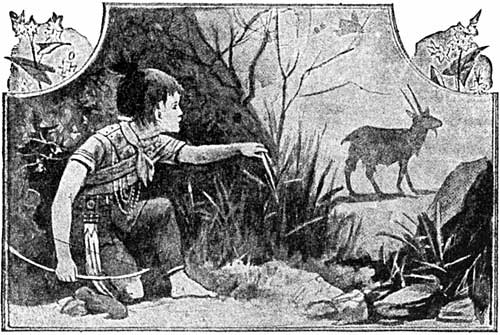
Shortly after this Hiawatha set out in his canoe to catch the sturgeon Nahma, king of fishes. The monster fish lay on the white sand at the bottom of the[15] river, and Hiawatha, line in hand, sat in his canoe, shouting: "Take my bait, O Nahma; come up and let us see which is the stronger!" At length Nahma grew weary of this clamor, and said to the pike: "Take the bait of this rude fellow and break his line." The pike tugged at the line till the birch canoe stood almost endwise, but Hiawatha only pulled the harder, and when the fish rose to the surface he cried with scorn: "You are but the pike; you are not the king of fishes," and the pike sank down ashamed to the bottom of the river. Then Nahma bade the sun-fish break Hiawatha's tackle, but again Hiawatha pulled the great fish to the surface of the water and again cast him down, crying: "You are not the fish I wanted; you are not the king of fishes!" Then Nahma grew angry,[16] and, opening his huge jaws, swallowed both canoe and Hiawatha. Finding himself in utter darkness, Hiawatha groped about till he felt the monster's heart which he smote so fiercely that he killed him. Anxious to escape from his dark prison, Hiawatha waited till the giant sturgeon drifted on to the shore, then called for aid to his friends the sea-gulls, who worked with their claws and beaks till they made a wide rift in Nahma's side and set Hiawatha free.
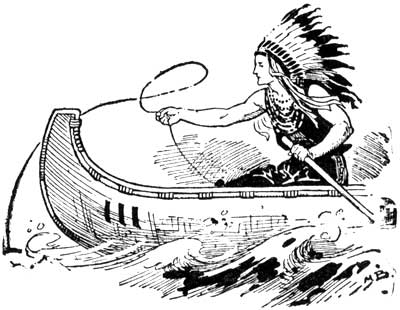
Proud of her grandson's bravery, old Nokomis now set him a difficult task. "In a land lying westward, a land of fever and pestilence, lives the mighty magician, Pearl-Feather, who slew my father. Take your canoe and smear its sides with the oil I have made from the body of Nahma, so that you may pass swiftly through the black pitch-water and avenge my father's murder." Thus spoke old Nokomis, and Hiawatha did as she bade him, smeared the sides of his boat with[17] oil and passed swiftly through the black water, which was guarded by fiery serpents. All these Hiawatha slew, and then journeyed on unmolested till he reached the desolate realm he sought. Here he shot an arrow at Pearl-Feather's lodge as a challenge, and the magician, tall of stature, dark and terrible to behold, came forth to meet him. All day long raged the greatest fight that ever the sun had looked on, but no weapon could penetrate Pearl-Feather's magic shirt of wampum, and at sunset, wounded and weary, with three useless arrows in his hand, Hiawatha paused a while to rest beneath the shade of a pine tree.
As he stood there, despairing of victory, a wood-pecker sang from the branches above him: "Aim your arrows at the roots of his long hair; there alone he can be wounded." Well it was for Hiawatha that he understood the bird's language! Stringing the first of his arrows to his bow he let fly at Pearl-Feather, who was stooping to pick up a heavy stone. The arrow struck him full on the crown, and the second and third arrows, swiftly following, penetrated deep into the wound, so that the mighty magician fell lifeless at Hiawatha's feet. Then Hiawatha stripped the magic shirt of wampum off his dead foe and took from his wigwam (or tent) all his wealth of furs, belts, and silver-tipped arrows. And our hero sailed homeward in triumph and shared his spoils equally among his people.[18]
Now there came a time in the life of Hiawatha when he wished to wed, and his thoughts turned to Minnehaha, whom they called Laughing Water, loveliest maiden in all the land of the Dacotahs. He spoke to Nokomis of this, telling her that his wedding with the fair Dacotah should heal all strife between the two tribes. So eloquently did he speak of the maiden's beauty and skillfulness in household matters, that he overruled Nokomis' many objections to his choice of a stranger, and set out in all haste to seek his bride. After a long journey he reached the home of the arrow-maker, whom he found seated in the doorway of his wigwam making arrow-heads, with his daughter at his side, busily engaged in plaiting mats of rushes. Hearing a rustling in the woods they looked up and saw Hiawatha standing before them, carrying on his shoulders a deer he had just slain. This offer he laid at the feet of Laughing Water, and the old man and the maiden both bade the young hunter welcome; then Minnehaha prepared a meal and set it before the two men. When they had finished eating, Hiawatha spoke of his childhood, his friends, and of the happiness and plenty in his land. "After many years of strife," said he, "there is now peace between your tribe and mine. In order to make the peace more lasting and our hearts more united, give me this maiden for my wife." And the ancient arrow-maker answered gravely: "Yes, if[19] Minnehaha wishes; let your heart speak, Minnehaha!" Then the maiden rose up and took the seat beside Hiawatha, saying softly: "I will follow you, my husband." Thus was Hiawatha's wooing, and hand in hand the young couple went away together, leaving the old arrow-maker in his loneliness.
When Hiawatha and his fair bride reached their home, old Nokomis prepared a sumptuous wedding-feast to which many guests were bidden. Among them was a handsome but idle and mischievous youth named Pau-Puk-Keewis, who was renowned for his skill in all sports and pastimes. To please the company he rose from his seat and danced his merry dances to the music of flutes and drums. Then the sweet singer, Chibiabos, sang a melodious love-song, and when this was finished, Iagoo the Boaster, jealous of the praise and applause bestowed on the musician, told one of his most marvelous stories, and well pleased the wedding-guests took their departure.
As the days went on, old Nokomis found that her grumblings about the uselessness of a wife from a far-off land had not been justified, for Minnehaha was as skilled with her fingers as she was beautiful, and Hiawatha loved her more and more dearly.
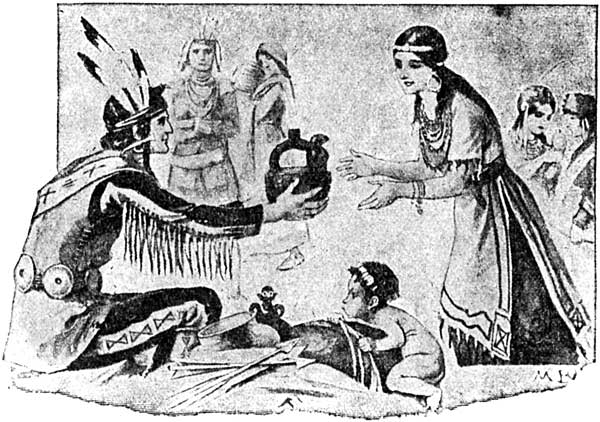
Once, when all the maize was planted, Hiawatha bade his wife go alone at night, clothed only in her dark tresses, and draw a magic circle round the cornfield[20], so that no blight or insect might injure the harvest. This Minnehaha did, but the King of Ravens and his band of followers, who were perched on the tree-tops overlooking the cornfield, laughed with glee to think that Hiawatha had forgotten what mischief they could do. So early on the morrow all the black thieves, crows and blackbirds, jays and ravens, flew down on the field, and with claws and beak began to dig up the buried grain. But the wary Hiawatha had over-heard the birds' mocking laughter and, rising before daybreak, had scattered snares over the fields. Thus it happened that the birds found their claws all entangled in the snares, and Hiawatha, coming out from the hiding-place where he had been watching them,[21] killed them without mercy; only one was spared, the King of Ravens himself, whom Hiawatha pinioned with a strong rope and fastened to the ridge-pole of his wigwam as a warning to all other thieves.
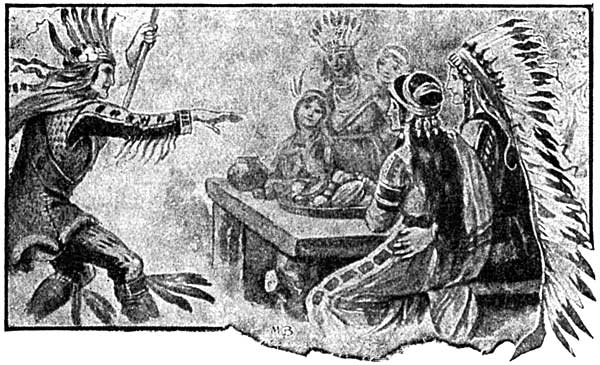
Now it chanced one day that the mischievous Pau-Puk-Keewis wandered through the village and reaching the farthest wigwam, which was that of Hiawatha, found it deserted. The raven perched on the ridge-pole, flapped his wings, and screamed at the intruder; but Pau-Puk-Keewis twisted the poor bird's neck and left the lifeless body dangling from the roof; then he entered the lodge and threw all the household things into the wildest disorder as an insult to the careful Nokomis and the beautiful Minnehaha. Satisfied with the mischief he had done, Pau-Puk-Keewis climbed a[22] rocky headland overlooking the lake and amused himself by killing the sea-gulls as they fluttered round him.
When Hiawatha returned, fierce anger rose in his heart. "I will slay this mischief-maker," said he, "even if I have to search the world for him." Together with other hunters he set out in hot pursuit, but cunning Pau-Puk-Keewis outstripped them all and ran, swift as an antelope, till he came to a stream in the midst of a forest where the beavers had built a dam. "Change me into a beaver," he entreated them, "and make me larger than yourselves, so that I may be your ruler and king." "Yes," said one of the beavers, "let yourself down into the water, and we will make you into a beaver ten times larger than any of ourselves." This they did, but not long had Pau-Puk-Keewis sat in state among the beavers when they heard a trampling and a crashing above the water, and the watchman cried: "Here is Hiawatha with his hunters!" All the other beavers made their escape through the doorway of their lodge into deeper water, but so large had Pau-Puk-Keewis become that he could not pass through the opening. Then Hiawatha, peering through the water, recognized Pau-Puk-Keewis, in spite of his disguise, and slew him. Six tall hunters bore the dead body of the beaver homeward, but the spirit of Pau-Puk-Keewis was still alive within it, and escaping, took its human form again and vanished into the forest.[23]
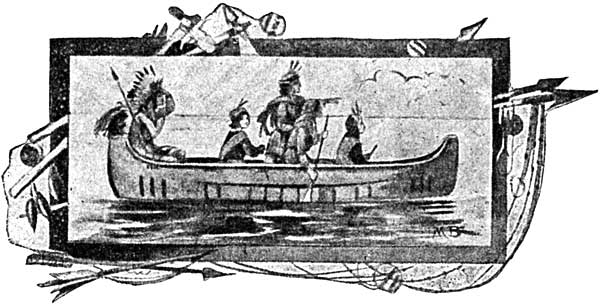
Only the wary Hiawatha saw the figure as it disappeared and followed in hot pursuit. Hard pressed, Pau-Puk-Keewis reached the edge of the lake and besought a brant (or wild goose) to change him into one of themselves, and to make him ten times larger than the others. Straightway they changed him into an enormous brant, and, with a whirr of wings, the whole flock rose in the air and flew northward. "Take good heed and look not downward, lest some great mishap befall you," cried the other birds to Pau-Puk-Keewis, and he heeded their words. But on the morrow, as they continued their flight, Pau-Puk-Keewis heard a great shouting in the village beneath and knew the voices of Hiawatha and Iagoo. Forgetful of his warning, he looked downward, and the wind caught his plumage and sent him whirling towards the earth. In vain he struggled to regain his balance—he fell[24] heavily to the ground and lay dead with broken pinions. But his spirit was still alive, and, taking its human form, again fled from Hiawatha. This time Hiawatha pursued his cunning foe so closely that he could almost touch him, but Pau-Puk-Keewis changed himself into a serpent and glided into a tree. While Hiawatha was groping in the hollow trunk, the mischief-maker once more took his human shape and sped away until he came to the sandstone rocks overlooking the Big Lake; and the Old Man of the Mountain opened his rocky doorway and gave Pau-Puk-Keewis shelter. Hiawatha stood without and battered against the caverns shouting, "Open! I am Hiawatha!" But the Old Man of the Mountain neither opened nor made answer. Then Hiawatha raised his hands to heaven and called the thunder and lightning to his aid. Stronger than any mortal power, the tempest smote the rocks till they fell to fragments, and there beneath the crags lay Pau-Puk-Keewis dead in his own human form.
This was Hiawatha's last victory—grief and loss were now to be his portion. The death of his two friends, Chibiabos and Kwasind, weighed on his mind, and, hardest of all, a long and dreary winter, bringing the specters of famine and fever in its train, came upon the land and robbed Hiawatha of his dearest treasure, his beautiful young wife.
Clad in her richest garments, Minnehaha was laid[25] to rest deep beneath the snow, and, as Hiawatha watched the fire which was kindled at night on her grave, his heart grew less heavy, for he felt that their parting was not for long. The time was soon to come when he too could depart to the Islands of the Blessed, where the spirit of his wife awaited him.
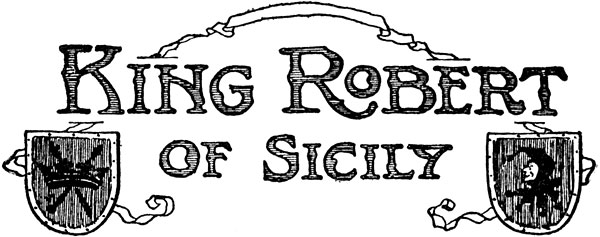

here was once a proud and selfish monarch, named King Robert, who ruled over the kingdom of Sicily. One of his brothers was the mighty Pope Urbane, and the other the rich Emperor Valmond, and King Robert spent as lavishly and held even a more magnificent court than either of them. But the Sicilian monarch was not beloved by his subjects, for he treated them all with disdain, and in fact only looked on them as mere slaves, whose duty it was to carry out all his orders, no matter at what inconvenience to themselves.
One evening King Robert sat in state in the royal chapel and listened idly to the priests chanting the service. Clad in his magnificent robes he looked every inch a king, but his handsome face was marred by its look of conceit and weariness. He soon grew tired of listening to the service and let his thoughts wander,[27] but suddenly his ear was caught by some Latin words which were repeated over and over again, and, turning to a learned clerk who stood near him, he asked: "What mean these words?"
The learned man at once made reply: "He hath put down the mighty from their seat, and has exalted them of low degree."
"'Tis well," said King Robert scornfully, "that such treason is only uttered by priests and in the Latin tongue. My subjects, whether priests or common people, know full well that there is no power which can hurl me from my throne." Saying these words he yawned and leaned back in his throne, and soon, lulled by the monotonous chanting, he fell fast asleep.
When he awoke it was late at night. All the lights in the church had been extinguished, except a few flickering candles, which were burning before the shrine of some saint. The King started up from his seat and gazed with anger and amazement round the empty church. He groped his way towards the great door, but it was locked; then he shouted for assistance, uttered angry threats, and hammered against the door, but all in vain. At length the sexton, who lived hard by, was roused by the tumult, and, fearful lest thieves or some drunken revelers had made their way into the church, he came to the door, lantern in[28] hand, and cried in a quavering voice: "Who is there?"
"Open the door; 'tis I, the King!" shouted King Robert, almost choking with rage.
"This is some drunken rogue," muttered the sexton, as, with trembling fingers, he fumbled for the key. Pushing open the door, he stood timidly aside, and suddenly the disheveled figure of a man without cloak or hat rushed wildly past him. He neither turned nor spoke, but passed swiftly out into the darkness of the night, and the bewildered sexton soon lost sight of him.
Despoiled of his kingly garments, breathless and splashed with mire, King Robert rushed on till he came to the palace gates. He strode through the courtyard, thrusting aside the men-servants and pages who tried to bar his path, and hurried up the broad marble staircase. Rapidly he passed through the royal apartments, his face white with anger rendered still more ghastly by the glare of the torches; he heeded no one, nor stopped in his headlong course till he reached the great banqueting-hall.
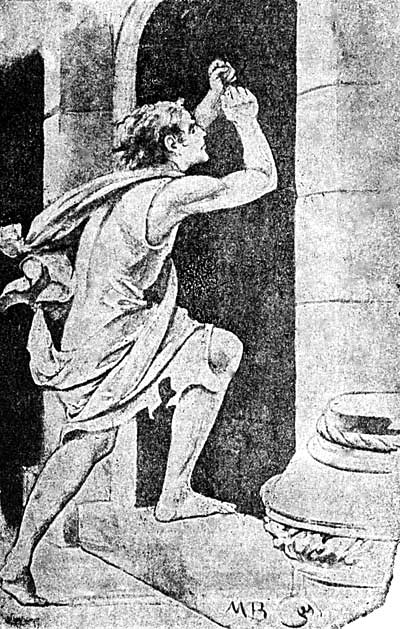
Here a grand feast was in progress, and the hall blazed with the light of thousands of wax candles. And to Robert's utter amazement, on the throne sat another king wearing his robes and crown, and, to all outward appearance, King Robert himself. None present, not even Robert himself, recognized that the [30]supposed king was an angel in disguise. Wearied of the King's evil ways he had come down to earth to punish the monarch of Sicily and humble his pride, and this was the way he had chosen to carry out his purpose.
For a while the throneless King gazed with mingled anger and astonishment at the angel, who met his glance with a look of compassion, and then said: "Who art thou, and why comest thou hither?" to which the King haughtily replied: "I am the King, and come to claim my throne from the impostor who usurps it."
At these audacious words the guests sprang up in anger and drew their swords to slay the man who dared speak thus to the King, but the angel answered calmly: "Thou art not the King, but henceforth thou shalt be the king's jester and wear cap and bells and motley. As counselor thou shalt lead an ape, and thou shalt obey my servants and wait on my hench-men."
No sooner said than done. Deaf to King Robert's cries, prayers, and entreaties, the men-at-arms thrust him from the hall. A group of tittering pages ran before him and threw wide open the great folding-doors. And now the King's heart was filled with alarm, for he heard shouts of rude laughter and mocking cries of "Long live the King!" and he realized[31] that no one in the kingdom either knew or cared who he really was.
Thrust from out his palace, the outcast King was led to some small shed adjoining the stables. A door was opened, an armful of straw thrown down within, and here he was bidden to sleep. When he awoke the next morning he thought to himself it must all have been a dream, but, as he turned his head, his couch of straw rustled beneath him, and he heard the horses neighing in the stable hard by. Beside his bed lay cap and bells and the parti-colored dress of a court-jester and in one corner of the bare cell sat a shivering, chattering ape. Then King Robert realized that it was not a dream but a dreadful reality, and that the most wretched beggar in the kingdom would have scorned to change places with the poor jester—the butt and laughing-stock of every underling at court.
Days lengthened into months, and, under the angel's wise government, a time of prosperity returned to Sicily and the land produced rich harvests of corn and wine. The people no longer groaned under the burden of taxation, and the King's ministers rejoiced greatly at the welcome change which had come over their young master.
Meanwhile the real King Robert yielded sullenly to his fate. Mocked at by all, his only friend the ape, his food the scraps left by others, his heart was[32] still haughty, his pride unsubdued. And when sometimes the angel meeting him would ask, half in jest, half in earnest, "Art thou the King?" he would draw himself up and fling back the haughty answer: "I am, I am the King!"
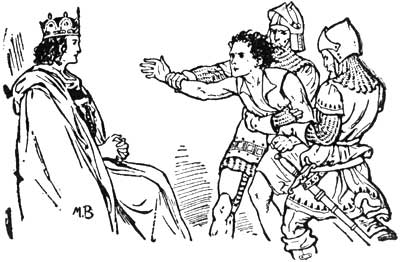
Almost three years had passed away when there came ambassadors from Valmond, Emperor of Allemaine, to the King of Sicily, saying that their brother, Pope Urbane, had summoned them both by letter to the city of Rome to celebrate Easter week with him there.
The angel received his guests with great joy and gave them rich presents of velvet cloaks lined with ermine, rings, and rare jewels. Then he made his preparations and set out with his retinue over the sea to the land of Italy. Crowds of people came out to watch the progress of the royal procession. The horses had gold and silver trappings, jeweled bridles, the knights wore velvet cloaks and waving plumes, and[33] their silver spurs glittered in the sun. Then came the angel-monarch in rich attire surrounded by his counselors and the flower of his knights. The men-at-arms and servants brought up the rear of the procession, and among them, on a shambling piebald steed, his ape perched behind him and his cloak of foxtails flapping in the wind, rode the jester-king—a strange sight which caused unbounded merriment in all the country towns through which the procession passed.
Arrived in Rome, the Emperor and his supposed brother were received with great pomp in the great square before St. Peter's. Little did the Pope dream, as he bestowed his blessing and prayers on his younger brother, that he was entertaining an angel unawares.
Suddenly a wild, unkempt figure rushed from among the crowd and into the royal assembly. Forcing his way to the place where the Pope was seated he cried loudly, "I am your brother Robert, King of Sicily. This man who stands before you in my semblance is an impostor disguised as the King. Do you not know me? Is there no voice within you that says I speak truly, and that I am indeed your brother?"
The Pope made no reply, but gazed with troubled look at the angel's unruffled face. Then the Emperor Valmond laughed and said:
"Brother, methinks you have strange taste to keep a madman for your court-jester!"[34]
It seemed quite evident to the bystanders that what the Emperor said was very true, and once more, baffled and disgraced, the poor jester was roughly thrust back among the wondering crowd.
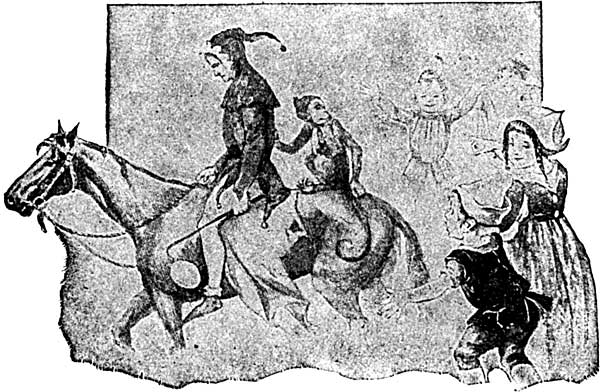
The week was spent in prayer and stately rejoicing till at length Easter Sunday dawned upon the world. The presence of the angel filled the city with gladness and the hearts of men with piety. Even the wretched jester felt the influence of some gracious power, and, kneeling on the floor of his cell, he humbly bowed his head in prayer. He felt new strength rising within him, and new resolves, strangely meek ones for so proud a King, were made by him on that glorious Easter morn.
The next day the three royal brothers bade each[35] other farewell. Emperor Valmond made his way northward to his kingdom by the Danube, while the angel journeyed southward through the towns of Italy. Once more the people marveled at the magnificence of his train, and once more the jester became the laughing-stock of all the watching crowds, but he rode on unheeding. His mad anger was stilled and he began at last to realize that he had indeed deserved his dreadful punishment.
When the town of Salerno was reached the journey was continued by sea, and soon the royal retinue was safe within the walls of Palermo. Seated on his throne in the great hall, the angel listened dreamily to the convent bells, which sounded to him like voices from another world.
Presently he roused himself from his meditations, and, with a gesture of his hand, bade the rest of the court retire, and beckoned the jester to draw near him. When the two were left alone, the angel said: "Art thou the King?"
King Robert crossed his hands upon his breast, and, bending his head, answered meekly: "Thou knowest best. My sins are very heavy; let me go at once and do penance in a cloister. There I will school my spirit to humility, and walk barefooted across the stones till my guilty soul is shriven."
The angel smiled, and his radiant face seemed to[36] illumine the hall with a holy light. Then loud and clear through the open window the monks were heard chanting in the chapel hard by: "He has put down the mighty from their seat, and has exalted them of low degree."
And through the chant rose a second melody, a single melodious voice, and the King seemed to hear the words: "I am an angel, and thou art the King."
King Robert, who was standing near the throne, at length ventured to lift his eyes, and, behold! he was alone in the hall! Looking round in wonderment, his eye was caught by his attire; instead of the sorry garb of the jester he was clothed in royal robes of ermine and cloth of gold.
Kneeling at the foot of the throne, King Robert gave heartfelt thanks to the Divine Power which had taught him the error of his ways, and, when his courtiers came to seek their royal master, they found him still kneeling, absorbed in silent prayer.


ave you ever peeped into a forge and seen a blacksmith at work? It is quite exciting, I assure you, to see the flames being fanned by the bellows, and myriads of sparks flying upwards and outwards on all sides, while the blacksmith hammers the red-hot metal on the anvil and shapes it into horseshoes and other useful things made of iron.
But there is one particular blacksmith whose acquaintance I want you to make. He lives in a little village and his forge stands beneath the shade of an immense chestnut tree with wide out-spreading branches. The smith is a mighty man, and well he needs to be, for his work requires great strength. His hands are large and sinewy and his muscles like iron; his face is bronzed by the sun and his black hair is long and curls crisply. He does not make a great deal of money in spite of all his hard work, but he earns[38] quite sufficient for his own modest wants and to provide his only daughter with all the necessaries of life, and even a pretty gown to wear in church on Sundays. His one modest boast is that he is able to look every one honestly in the face, for he is not in debt for a single farthing.
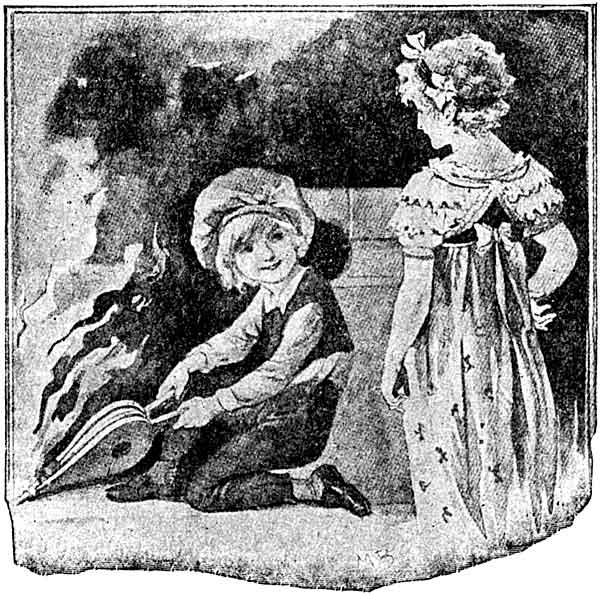
The village blacksmith works hard from morning till night; at any time in the day you pass by the forge you can hear the bellows being blown by one of his[39] boys, while he himself swings his heavy sledge-hammer, keeping such regular time with his strokes that it calls to mind the tolling of the village bell—a custom which the old sexton never omits as the day draws to its close. On their way home from school, all the village children love to peep in at the open door of the smithy to see the flaming forge and hear the roar of the bellows. They have a fine game at pretending to catch the sparks, which fly about as the chaff does when the corn is being threshed in the barns at harvest time.
But on Sunday the blacksmith puts aside all his labor and goes with the other villagers to church, where he takes his usual seat among his boys. He listens attentively to the praying and preaching, and above all to the singing, for his daughter is in the village choir and the sound of her sweet voice brings joy into his heart. His thoughts go back to the time when his young wife sang in tones as clear and pure as these, but God thought fit to call her from him years ago to sing in the heavenly choir. As he thinks of her lonely grave in the churchyard close by tears rise in the blacksmith's eyes, but he wipes them away with his hard rough hand and resolves to be grateful for the many blessings still left to him.
When the service is over and the congregation leaves the church, after greeting his friends, the blacksmith[40] turns aside and, standing by his wife's grave, reads once more the simple inscription on the stone which he has put up to her memory. But you may be sure that the blacksmith's pretty daughter knows where he is to be found, and, taking him gently by the arm, leads him homeward, beguiling the way with cheerful words.
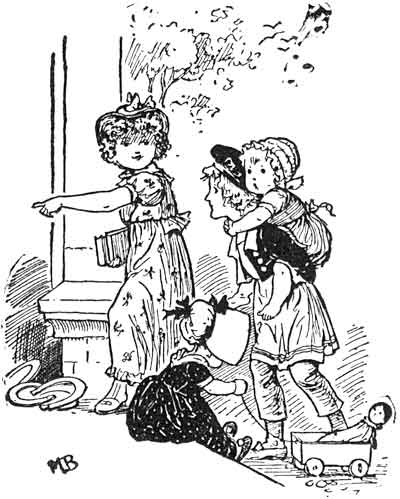
This is how the busy blacksmith spends his life—toiling, rejoicing, sorrowing. Every morning he begins some fresh task and he works so hard that by evening he has finished it. He has attempted something and he has completed something—surely he has well earned his night's rest.
We may all learn a useful lesson from the life of the village blacksmith. Let us try to live as honestly, as[41] uprightly, and as laboriously as he, so that one day we may deserve to hear the words, "Well done, My good and faithful servants!" Let us try so to live that each action of our lives shall be a good and shapely thing, a help and a benefit to others, like the horseshoes made by the honest blacksmith are to our four-footed friends.
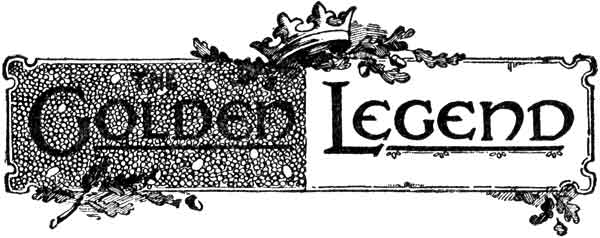

he land of Germany has always been famous for its store of wonderful songs and legends. Its poets of olden days, who were known as the Minnesinger, used to wander round the country singing or reciting these tales and everywhere they went they were sure of a warm welcome. The "Golden Legend" is one of these old stories, and runs as follows:
Lucifer, who was once one of the good angels, had been cast out of Heaven for the sin of pride. He gathered all the spirits of evil around him and made himself their leader. His one desire now was to do harm to all mankind and, by putting wicked thoughts into men's minds, make them themselves do evil so that he might grieve the good angels and thus take revenge for the punishment which had been inflicted on him.
Among other wicked deeds he sought to tear down[43] the spire of Strasburg Cathedral, but was defeated by the good spirits, who kept unceasing watch and ward over the holy place. Baffled in this attempt, Lucifer betook himself to a castle on the Rhine, the dwelling of young Prince Henry of Hoheneck. Prince though he was, his lot was a most unhappy one, for he was suffering from a deadly disease which the most famous physicians had been unable to cure. Ill and restless, Prince Henry was sitting alone at midnight in a tower of his castle, when suddenly there came a flash of lightning, and Lucifer, disguised as a doctor, stood before him.
"All hail, Prince Henry!" said the stranger.
"Who are you," asked the Prince, "and what may be your purpose in coming hither?"
"I am a traveling physician," replied the cunning spirit, "and I can cure all diseases."
"But not mine," said Prince Henry, mournfully. "I have consulted almost every famous doctor, but the case is quite beyond their science. Even the learned doctors of Salerno have sent me back word that they know of no cure for a malady like this save one, which from its very nature is impossible."
"What is this mysterious remedy?"
"Read, and you shall see," answered the Prince, handing Lucifer a scroll on which were these words:[44]
"A strange remedy, indeed," said the false physician, "and one which you will never be able to try. However, I have with me here a wonderful draught which cures all pain—will you not taste it?"
Prince Henry hesitated, but finally drank from the crystal flask which Lucifer gave him. The evil spirit disappeared with mocking laughter and Prince Henry fell to the ground in a swoon. The magic draught which the false doctor had given him was nothing but an enchantment destined to work still more harm on the victim. The next morning the unfortunate Prince was found by his attendants stretched on the floor of the tower chamber and seemingly lifeless. When he began to recover, further troubles were in store for him. He was summoned to appear in church before a council of priests, who pronounced him to be a leper and an outcast, and decreed that henceforth he was to be looked upon as one dead. The burial service was read over him and then Prince Henry, clothed in a cloak of hodden gray, and carrying a beggar's wallet, was thrust from the door of the church into perpetual banishment.
A lonely exile, Prince Henry wandered through the[45] land till he came to a farm in the Odenwald, where dwelt the worthy peasant Gottlieb, with his wife, Dame Ursula, and his daughter, Elsie, a beautiful maiden of fifteen summers. These good people took compassion on their Prince and begged him to dwell with them and share all they had. Glad to find a resting-place among kindly folk, the Prince stayed for some months at the farm, but each day he seemed to become a little weaker. The disease from which he was suffering had made such rapid progress that he felt his death rapidly drawing near. In these days of weakness and despair the Prince tried to console himself by reading the old legends, and watching Elsie as she flitted about the garden, gathering flowers to lay at the shrine of her favorite saint. He would read aloud to her, and she would give him some of her flowers and try in her gentle way to make her dear Prince forget his heavy troubles.
Gradually Elsie grew to love the Prince with such devotion that it seemed to her that no task could be too difficult, no sacrifice too great for her to make, if only she could save his life. And then the thought suddenly came to her that she would make the greatest sacrifice of all and give her life, so that the cure of which the learned doctors of Salerno had written might be carried out.
Filled with this resolve, she told her father and[46] mother, who wept bitterly and sought by every means in their power to dissuade her, but all in vain. Then Elsie sought the Prince and begged him to allow her to do this for him. His life, she said, was valuable to his country and his people, for he would be restored to health and rule over them again, whereas she was but a poor peasant girl and her place could easily be filled.
Prince Henry struggled for some time against the temptation to accept the sacrifice of this young life, and finally determined to go to the village church and ask the advice of the priest in the matter. But the Prince delayed his coming, and the priest had to leave the church at sunset and go forth to visit the sick and needy. Lucifer, who was watching his opportunity, slipped into the church, disguised this time as a priest, and took his seat in the confessional. When the Prince at length appeared and besought the priest to tell him whether he might justly allow the maiden to give her life for his, instead of showing him how wicked such an action would be and that it would be far better in God's eyes that he should bear his sufferings uncomplainingly, the evil spirit persuaded the wavering youth that the deed was right and necessary and had the Church's full approval.
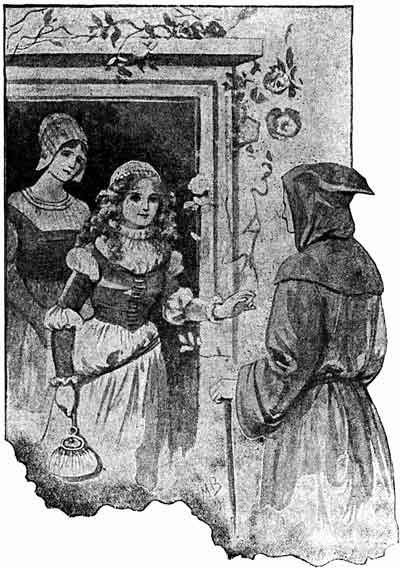
Heedless of the voice of his good angel, which whispered to his conscience that he was doing wrong, [48]the Prince returned to the farm and announced that he was prepared to accept the divine gift of life from Elsie's hands. One request only did the maiden make, that, on their pilgrimage to Salerno, neither by word nor deed should Prince Henry attempt to dissuade her from her purpose. Elsie had no fear of death and, when she had taken a last farewell of her grief-stricken parents, the Prince set out with her on their long journey.
Easter Sunday found them in Strasburg, where the Prince tarried with Elsie in order that they might witness the Miracle Play, which was acted within the cathedral. After that, the next stage of their journey brought them to Hirschau, where Prince Henry sought a night's shelter at the monastery, after having placed Elsie under the charge of the Abbess Irmingard in the nunnery a short distance away.
Lucifer, ever watchful lest the Prince should escape from his evil influence, was here too. Disguised as a monk, he mingled with the brethren at the convent and stirred up strife among them, so that the Abbot grew very wrathful and inflicted severe penances on all the offenders.
After vespers had been sung, the monks retired, but one lingered, for he was blind and walked slowly, led by a little chorister. As he drew near, Prince Henry started back in amazement.[49]
"Do my eyes deceive me in this dim light," he exclaimed, "or can this be Count Hugo of the Rhine, my most deadly foe?"
The old monk, who had come so close that he could hear Prince Henry's words, replied sadly: "Count Hugo of the Rhine was once my name, but now you behold the wreck of my former self. My pride and headstrong will have brought me to this plight. Deserted by my friends, defeated by my enemies, alone and blind, I heard a voice call me by name and say: 'Kneel down and pray.' So now you behold me a member of the holy brotherhood, ever striving by prayer and repentance to blot out the remembrance of my evil deeds. You, who by your voice I know to be Prince Henry of Hoheneck, are one of those who have most cause to hate me. Curse and revile me if you will; I will bear it patiently."
"We both have erred," sadly answered the Prince, "but the hand of God has chastened us both. Let us therefore pray for forgiveness together."
Hand in hand the two former enemies humbly knelt in prayer, and Lucifer, himself the spirit of arrogance and pride, slunk away, powerless to do evil to those who truly repent of their sins.
Meanwhile, Elsie sat with the Abbess Irmingard in the moonlight, while the latter told the sad story of her life to her young companion.[50]
"Years ago, when I was a maiden freshly returned from the convent school, wandering Minnesinger used to come to my father's castle where they were always made welcome. The noblest and most gallant of all these bards was Walter of the Vogelweid; his voice was the sweetest and his songs the most beautiful. We looked on each other and loved, but a foreign prince sought my hand and my stern father bade me wed him and forget the wandering minstrel. I refused to be the bride of any other than Walter. 'Either you obey me,' said my father, 'or you shall become a nun and die unwed.' That very night I secretly left the castle and stole away with my lover. We went swiftly on horseback through the forest, but our flight was soon discovered—we were pursued and overtaken. I remember nothing more till I awoke in my own room, ill with a raging fever. When I recovered, I was sent to this nunnery and the convent gates, clanging behind me, seemed to be those of a prison. But all this was many years ago and now I am content and have found peace.
"I have told thee this tale," said the Abbess to Elsie, "for I feel strangely drawn to thee. In thy young life there is too a tale of mystery and pain, and, as my way has been made clear, so shall be thine."
The next day Elsie and the Prince bade farewell to their kindly hosts and traveled, as swiftly as horses[51] could carry them, through Germany and Switzerland. After leaving Lucerne they hired a trusty guide to lead them through the mountain passes, which were steep and dangerous. On one part of the journey they had to cross a single arch bridge, which spanned a terrible abyss, and their guide told them the story of how it came to be built.
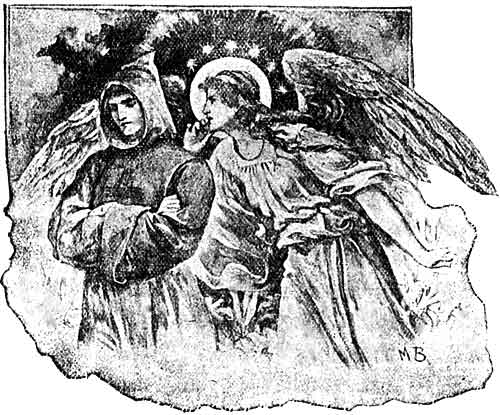
"For years and years people had tried in vain to make a bridge at this point, but all their efforts had been fruitless, for whatever was built by day the devil swept away at night. At last a holy abbot built this one with a single arch and made a compact with the evil one that it should be allowed to stand, on the condi[52]tion that the first living thing which crossed it should be surrendered into his clutches. When the bridge was completed, the abbot, standing at one end, threw a loaf of bread across, which a hungry dog sprang after, and the rocks re-echoed with laughter to see the devil thus defeated."
"Defeated," sneered Lucifer, who was standing beneath the bridge. "It was for journeys and crimes like this that I allowed the bridge to stand!"
Unconscious that Lucifer was dogging their steps, the princely train finished its journey through Italy in safety, took ship at Genoa, and reached the town of Salerno, renowned for its learned doctors and its schools.
Entering the town, Prince Henry inquired for Friar Angelo, and Lucifer, appearing before him in fresh disguise, said: "He stands before you."
"You know, then, on what errand I have come," said the Prince. "I am Prince Henry of Hoheneck and this is the maiden I spoke of in my letters."
"This is a grave business, and we must not be over-hasty," answered the crafty Lucifer. "Does the maiden consent to this of her own free will?"
"No prayers or entreaties can dissuade her."
"Strange, indeed. Have you thought well over it?" asked Lucifer, turning to Elsie.
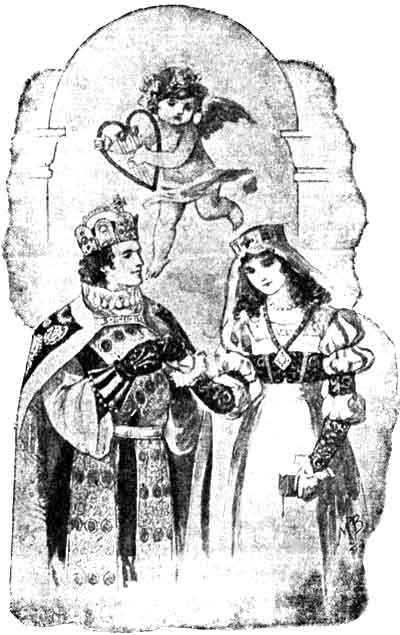
"I do not come here to argue, but to die," replied [54]Elsie. "Your business is not to question but to kill me, and I am ready."
With a last farewell to Prince Henry and her weeping attendants, Elsie followed Lucifer into a gloomy building. The Prince tried to follow them, but Lucifer thrust him back and barred the door. Suddenly the Prince's better angel prevailed and he realized what a vile thing it was that he should purchase health and strength at such a cost. Sooner would he himself die a lingering death than that harm should come to Elsie, who had grown so dear to him during their long journey together. Shouting to his men to aid him, he burst open the door and rushed in to save her.
A few weeks later, Dame Ursula was sitting in her cottage spinning and thinking sadly of her child's untimely death, when a forester stopped at the farm and inquired for Gottlieb.
"I am his wife," said the dame.
"Then I have news for you. The Prince is strong and well again."
"Then Elsie, my poor child, is dead," she rejoined, mournfully.
"It is true that your daughter is no longer the humble peasant she once was."
"Nay, do not mock a mother's agony, and tell me truly what has befallen my child," she implored.[55]
Then the forester told Ursula his wonderful news; how at Salerno the Prince's nobler self had prevailed, and the maiden's life had been spared, whereupon a miracle had been worked on the Prince and he had straightway been healed.
"They call your daughter the Lady Alicia now," continued the messenger, "for the Prince made a vow in Salerno that he would wed no one but Elsie. At this very moment the Prince and his bride are sailing homeward down the Rhine in a splendid barge decked with banners, and all the people are gathered on the banks, shouting with joy."
Dame Ursula's raptures can be better imagined than described, and she rushed away to tell her husband the glad tidings, while the forester calmly sat down and helped himself to Gottlieb's supper.
And so we may leave the Prince and his young bride with the feeling that their wedded life proved to be a very happy one, for their love had been tried by pain and suffering, and a love which can conquer these is one which will endure.
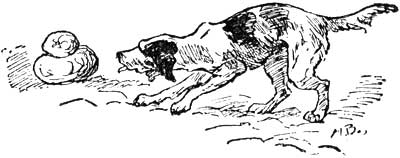
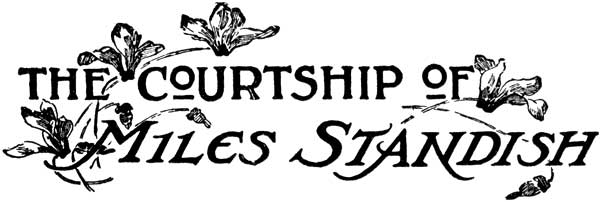
n olden days, a ship called the Mayflower left the shores of England and set sail for a distant and unknown land, carrying a number of Puritan pilgrims on board. Among their number were two men who were close friends, though they were utterly different both in character and looks. Miles Standish was a short, strongly built man with muscles and sinews like iron; his reddish beard was already flaked with patches of white and his face browned from his out-of-door life. Hasty and passionate, Miles Standish was, nevertheless, a born leader of men, and was greatly respected by all who knew him. His friend, John Alden, was a much younger man, with fair hair and blue eyes. He was no soldier, but skilled in all manual labor, and, moreover, a scholar and a scribe.
The two friends settled in the village of Plymouth, and Miles Standish soon distinguished himself by his warlike qualities and was made captain of the town,[57] while John Alden, who lived with him, acted as his secretary and household companion.
One day they were sitting together, Miles reading about Caesar's great victories, and John occupied in writing letters to his people at home, filled mostly with accounts of the beautiful Puritan maiden, Priscilla. Presently Miles Standish looked up from his reading and said to John: "When you have finished writing I have something important to tell you."
"I am ready to listen," cheerfully replied the young man.
"Since Rose Standish died years ago," said the Captain, "my life has been a very dreary one. In my hours of loneliness I have often thought of the maiden, Priscilla, who is as friendless as I am. She is quite alone in the world, for her mother, father, and brother all died in the winter. I have never dared speak my thoughts to her, but I want you to do so for me. Go to Priscilla and tell her that a blunt old captain, readier at action than words, loves her dearly. You are a scholar and can speak to her in tender words such as are best suited to win the heart of a maiden."
Bewildered and dismayed at his friend's request, John replied: "Indeed I cannot give such a message as this. If you would have a thing well done you must do it yourself, not leave it to others—these are your own words."[58]
The Captain gravely shook his head. "I cannot, indeed," said he. "I can march up to a fortress and summon the place to surrender, but I dare not face a woman with such a proposal. Surely you will not refuse to do what I ask in the name of our friendship."
John Alden felt he could no longer withstand the Captain's earnest request, so he reluctantly consented and went forth on his errand. His way led him through the woods, where he gathered some may-flowers as a gift for Priscilla. When he drew near Priscilla's home he found her spinning industriously and singing as she worked. As John entered, she rose and held out her hand to him, saying: "I knew it was you when I heard your step in the passage; I was thinking of you as I sat there spinning and singing."
John was so pleased that she should have been thinking of him that he could frame no reply, but held out the flowers to her in silent answer. Then they sat down and talked of their friends at home and of the Mayflower, which was to return to England the next day. Priscilla confessed she felt so lonely and wretched that she wished she could return to England too, and John answered: "I cannot blame you for that wish. A woman requires someone stronger than herself to lean on, so I have come to you now[59] with an offer of marriage from a good and true man, Miles Standish, the Captain of Plymouth."
Not even the Captain himself could have spoken more bluntly than did John, and Priscilla looked at him in amazement. At length she exclaimed: "If the great Captain of Plymouth is so very eager to wed me, why does he not come himself and take the trouble to woo me?"
Poor John tried to smooth matters over. Quite forgetful of himself, he pleaded the Captain's cause, said how kindly, generous, and brave he was, what a splendid soldier and leader, and added that any woman might be proud to be called the wife of Miles Standish. But all his eloquence was wasted, for the maiden only looked at him and said smilingly: "Why don't you speak for yourself, John?"
Here was a pretty pass for an honest man to be in! Joyful to think that Priscilla loved him and yet saddened for his friend's sake, John left the house and wandered down to the seashore, undecided what he ought to do in the matter. Suddenly he looked up and saw the shadowy form of the Mayflower riding at anchor, ready to set sail on the morrow, and he made up his mind that it was his duty to return to England on the ship.
Strong in his resolution, he returned home and related to the Captain all that had happened. But when[60] he came to the words Priscilla had spoken, the Captain stamped on the floor and shouted, angrily: "John Alden, you have betrayed me! We are no longer friends, and there can be nothing between us henceforth but war and hatred!"
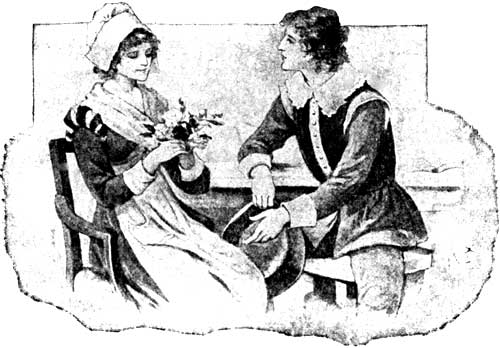
In the midst of his angry words a man came in bringing a message of urgent importance. There were rumors of danger, threats of war from hostile Indian tribes, and the Captain was summoned to a council meeting.
Still enraged, the Captain hastened away to the council and found it already assembled and impatiently waiting his coming. A ferocious-looking Indian was standing by a table on which lay a rattlesnake's skin[61] filled with arrows; this was the Indians' signal of warfare. The council was debating whether it would be better to reply to the challenge or try peaceful measures, but Miles Standish settled the matter without more ado. Advancing to the table, he picked up the rattlesnake's skin, and with a gesture of contempt jerked the Indian arrows from it. Then he filled the skin to the brim with powder and bullets and handed it back to the Indian, saying in a tone of thunder:
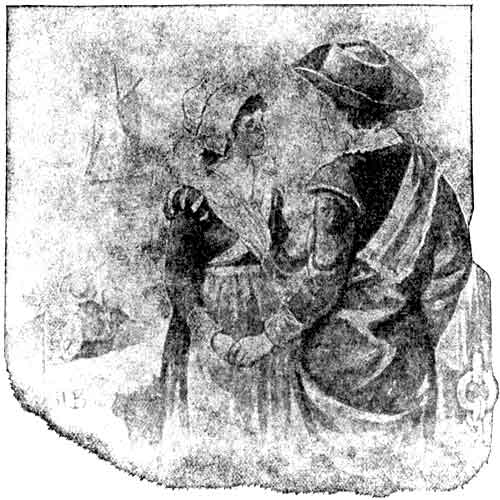
"Here, take it! This is your answer!" The savage took the challenge in silence, glided from the room, and soon disappeared into the recesses of the forest.
Miles Standish returned late from the council and threw himself, dressed as he was, on his pallet, so that he might be ready to set out at any moment. John Alden was lying awake, but he was resentful at the Captain's angry words to him and pretended to be asleep. At earliest dawn Standish awoke and, taking his musket, strode from the room. John Alden yearned to bid his friend farewell, but his pride would not let him, and he beheld the Captain depart in anger and spoke no word.
Then he arose, made his own preparations, and went down to the shore. A boat was waiting to convey him to the ship, but, as he was already standing with one foot on the gunwale, he caught sight of Priscilla looking at him with a sad and reproachful gaze.
At once his purpose changed. He determined that he would not go away, but would remain and protect her. The captain of the ship bade farewell to his friends and pushed off his boat. Not one of all who had set out in the Mayflower returned with her. The pilgrims wished the captain and his men Godspeed and went back to their life of toil in the new world.
As John turned to depart, Priscilla stood beside him[63] and they spoke together long and earnestly. She gently reproached John for pleading the cause of another. "I was hurt that you should urge me to marry Captain Miles Standish, even though he is your friend. I must tell you the truth; your friendship is more to me than all the love he could offer."
Said John: "Of all your friends, let me be the nearest and dearest, and I promise that I will be true and faithful to you always."
He would not say more than this, for, although he longed to tell Priscilla of his love for her, he had vowed not to do so. Loyalty to his absent friend forbade him and he thought to himself: "I will not speak to Priscilla of this until there is no longer any anger betwixt Miles Standish and myself."
Meanwhile, Miles Standish was marching steadily northward with a small troop of soldiers led by their brave Indian guide, Hobomok. After a three days' march they reached an Indian encampment and saw the women at work by the tents and the warriors sitting round the fire in full war-paint.
When the Indians saw the white men approaching, two of the mightiest warriors sprang up and came to parley with Standish, offering him a present of furs. Then they spoke through the Indian interpreter, begging the soldiers for muskets and powder, but when Standish refused and said he would give them a[64] Bible instead, they changed their tone and began to boast and bluster.
One of the chiefs cried: "Is this the mighty Captain the white men have sent to destroy us? He is a little man, let him go and work with the women!" Standish looked keenly round him and became aware of shadowy forms of Indians creeping round the bushes in ambush, but he feigned not to see them and stood his ground undaunted, listening calmly to the interpreter's words. But when the Indian chief began to taunt him, his hot blood rose within him, and, snatching the boaster's knife from him, he stabbed him to the heart. A flight of arrows immediately poured on the little band from all sides, but they replied with deadly fire from their guns and after a fierce fight the first victory lay with the white men.
Month after month passed by and Miles Standish continued to scour the land with his forces till his name became a terror to all the hostile Indian tribes. In the little village of Plymouth the time passed peacefully on. John Alden built himself a new house, dug a well, and planted an orchard hard by. As he worked he thought ever of Priscilla and knew that his happiness would not be complete until he might venture to ask her to share the fruits of his toil.
One day he was sitting with the maiden, awkwardly holding a skein of yarn for her to wind, when a mes[65]senger arrived in frantic haste bringing terrible news from the village. Miles Standish was dead, shot down by a poisoned arrow as he was leading his men to battle. Remorseful and yet glad that nothing now stood between him and the fulfillment of his hopes, John Alden turned to Priscilla and won her ready consent to become his bride.
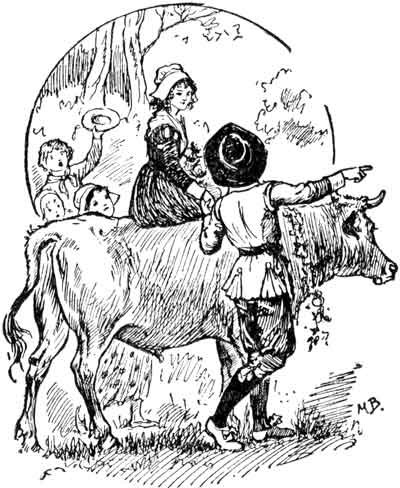
So one bright summer's day the simple wedding took place according to Puritan custom. Just as the service was ending, a somber figure clad in steel armor appeared on the threshold. The bridegroom turned pale at the sight and the bride hid her face on his shoulder. When the last prayer had been said, the figure strode into the room, and with amazement the[66] people beheld the Captain of Plymouth whom they had mourned as dead. Grasping the bridegroom's hand Miles Standish begged his forgiveness, which was gladly granted; he then saluted the bride and a new bond of friendship was entered into by all three. Full of eager questions the guests then gathered round the Captain, all speaking at once, till the poor man declared he had far rather break into an Indian encampment than come to a wedding to which he had not been invited.
When the confusion had at length subsided, John led out his snow-white steer covered with crimson cloth and with a cushion for a saddle. His wife, he declared, should ride to her home like a queen, not plod like a peasant. And so the bridal procession set out, Priscilla riding and John leading her gentle steed. No sad thoughts marred their homecoming, for their friend had been saved from a cruel death and his kindly words added a crowning joy to their happiness.
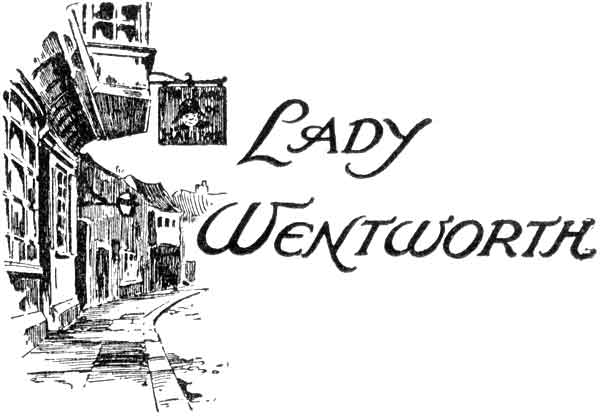

ne bright summer morning, rather more than a hundred years ago, comely Mistress Stavers stood with folded arms at her tavern door and watched her husband drive his stage-coach, four-in-hand, down the long lane and out into the country. Above her head hung the tavern sign—a portrait of the Earl of Halifax, resplendent in his scarlet coat and flaxen wig. Looking down, he was struck afresh with the charms of the tavern-keeper's handsome wife, and, though he was in a somewhat battered condition owing to his advanced age and the extremes of weather to which he had been exposed, he almost made up his mind to fall at her feet and declare his love.
At that moment, however, his train of thought was[68] interrupted by the vision of a barefooted, ragged little girl hurrying down the street. In spite of her shabby, mean attire, you could hardly help noticing how pretty she was, with her rough curly hair falling over her shoulders and her eyes dancing with laughter; in her hand she carried a brimming pail of water which dripped on to her little bare feet as she tripped along. Smiles played over the childish face and rippling sun-beams danced in her pail. The susceptible Earl of Halifax gazed at this picture with feelings of delight, but Dame Stavers evidently did not approve of it, for the Earl heard her say, "Fie for shame, Martha Hilton! How dare you go about the town half-dressed and looking such a sight!" The little gypsy maid laughed and replied saucily, "No matter how I look now. One day you will see me riding in my own chariot, ma'am."
Dame Stavers was too amazed at the audacity of these words to make any reply, but the Earl of Halifax smiled kindly at the little maid as she walked on with her heavy burden. When she reached the corner of the street, she looked back for a moment, then turned and passed out of sight.
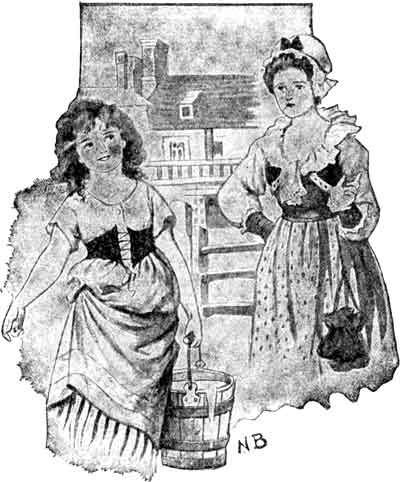
The Earl of Halifax swung for a while on his sign and pondered. His attention was next arrested by a magnificent carriage rolling rapidly by. Outriders in scarlet liveries bestrode the spirited horses, whose silver [70]harness glittered brightly in the sun. Within the chariot a dignified gentleman sat in solitary state. He was a stately personage with powdered hair, wearing a three-cornered hat and a crimson velvet coat; diamond buckles sparkled at his knees, and in his hand he carried a gold-headed cane. As the carriage passed the inn, Mistress Stavers dropped several low curtseys, for this was General Wentworth driving out to his great house, which stood just outside the town overlooking the sea.
A stately pile standing near the high road but hidden from it by trees, the Governor's house was indeed a pleasant abode. Within, it was magnificent to behold with its oak floors and carved chimney-pieces. All through the winter immense fires of logs blazed cheerily on the open hearths, while portraits of dead and gone Wentworths in heavy gilt frames looked placidly down from the tapestry-covered walls. Beneath the tapestry were doors which opened unawares and led into mysterious passages and up queer little flights of stairs.
Here dwelt the great man, Governor Wentworth, but no one shared its comfort with him, for he was a widower and childless, and though no one ever heard him complain, sometimes he felt his loneliness very keenly.
At this time Martha Hilton, the pretty little gypsy[71] maid was thirteen years old, and soon after the day when we met her tripping down the main street of Portsmouth, she went to be a servant at the house of Governor Wentworth. For seven long years she worked hard and faithfully.
Under her care the mirrors glistened and the brasses shone; the very knocker on the great front entrance looked brighter whenever she passed by. And all this time, as Martha grew from childhood into woman-hood, there was someone who watched, unknown to her, all her doings.
Time passed on, bringing with it the Governor's sixtieth birthday, and at the great house it was determined to give a banquet in honor of the occasion. Invitations were sent out to all Governor Wentworth's friends in the neighborhood, and when the day arrived, a very noble assemblage sat down to the feast. At the commencement of the banquet the Reverend Arthur Brown, the rector, who was seated at the host's right hand, said grace, and then the feast went on merrily. After the guests had finished eating and the King's health had been drunk, the Governor gave a whispered message to a man-servant, who disappeared and presently returned with a beautiful girl, simply and neatly dressed. The guests scarcely noticed her[72] presence, but the Governor stood up in his place and, looking down at the rector, said: "This is my birthday; it shall also be my wedding-day, and you shall marry me."
The guests were greatly mystified, and the reverend gentleman not less so, but he answered politely: "It would indeed be a pleasant task, your Excellency, but may I ask to whom I am to marry you?" "To this lady," replied the Governor, and beckoned to Martha Hilton to stand by his side. Blushing and confused the maiden timidly obeyed, but the rector hesitated and said nothing. Then the Governor cried impatiently: "If you hesitate to do as I ask you, then, as chief magistrate, I command you."
Seeing that all objections would be useless the rector obeyed, and read the marriage-service in loud, clear tones. The Governor placed a ring on the fourth finger of the bride's fair left hand, and Martha Hilton became Lady Wentworth of the Hall.
Thus the saucy boast, which the little gypsy had uttered in jest seven years before, came true, and when Lady Wentworth drove in her chariot through the main street of Portsmouth none dropped a lower curtsey than the tavern-keeper's wife. The Earl of Halifax smiled serenely but said nothing.
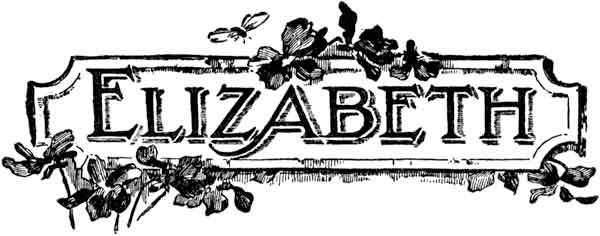
lizabeth Haddon, the gentle Quaker maiden, sat one winter evening in her farm-house kitchen, which served both for kitchen and parlor, and talked to Hannah the housemaid. "How short the days are," she said, "and how quickly night overtakes us. In the old country there is a long twilight, but here in the forest is hardly a moment between daylight and lamplight. Yet how grand winter is with its spotless mantle of snow."
"Oh, yes, winter is beautiful enough," replied Hannah, "and if only we could walk with our feet on the ceiling like flies, I should not complain. But this great river, the Delaware, is not crowded with tall sailing vessels like the Thames. Here we see nothing but pine-trees already flecked with snow. There is snow in the air and to-morrow all the roads will be blocked. I pity Joseph, who will have to break through the snow-drifts with his sled and oxen, and how in[74] all the world shall we get to Meeting on First Day (Sunday)?"
Elizabeth gently reproved her talkative servant for grumbling, then rose and put her sewing away. Meanwhile, Hannah fastened the shutters, spread the cloth, and lighted the lamp. Then she made the tea and placed on the table a brown loaf and butter fresh from the dairy. As they partook of their simple meal, Elizabeth said: "Joseph is a long time on his errand. I sent him to the village with a hamper of food and clothing for the poor. He is a good lad, always ready and willing."
Hannah smiled with pleasure at her mistress's praise of her fellow servant, and Elizabeth continued: "This house is a long way from the village, and we should be lonely if it were not for friends passing by who sometimes stay the night here."
Hannah, who resembled John Gilpin's famous wife in that she had "a frugal mind," did not altogether approve of what her generous mistress said.
"Many people do indeed pay us a visit," she remarked, "and they treat this house just as if it were an inn, coming and going exactly as they please."
"All I have is the Lord's, not mine," replied Elizabeth gently. "I am only left here in trust to distribute His gifts among the poor and those who devote their lives to His service. It was for this purpose that my[75] father built this house in the clearing, and, though he did not come here himself, I came in his stead. So we must not grudge to others the crumbs that fall from our table."
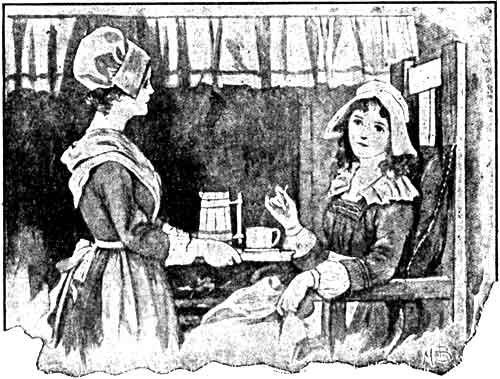
A little ashamed of herself, Hannah was silent for a while, and Elizabeth went on to say in her gentle voice: "Dost thou remember, Hannah, the great May meeting in London when I was still a child? No sound was heard in all that great assembly till at length a young man, named John Estaugh, rose in his place and spoke so powerfully that all hearts were stirred. I cannot tell why, but to-day there is a strong feeling within me that I shall see him again."[76]
As she finished speaking, a sound of sleigh-bells came nearer and nearer and a sleigh drew up at the farm-house gate. Joseph had evidently returned from his errand but not alone, for the voices of two men were heard talking together.
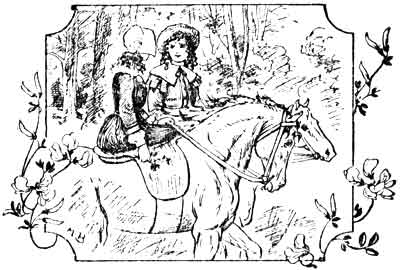
It was very dark in the yard, so Hannah lighted the great tin lantern and went out to give it to Joseph. Presently she returned, ushering in a tall and youthful stranger, whose cheeks were aglow from the wintry air. As he entered, Elizabeth advanced to meet him with outstretched hands, as if he were an expected guest, and said: "Thou art welcome, John Estaugh."
"Dost thou remember me, Elizabeth?" replied the stranger. "It seems a wonderful thing that after so many years have passed I should find thee again. It was surely the hand of the Lord which conducted me to thy threshold. As I was on my journey, I saw a wayfarer standing at the roadside seemingly weary[77] with travel. I greeted the man and offered to take him to his home. He mounted the sleigh beside me, and on the way he told me of thee and thy homestead. And, as I remembered thy name and thy father and mother in England, I have paused on my journey to see thee and wish thee strength in the good work thou art doing."
At that moment Joseph came in carrying the lantern, which he carefully extinguished and hung on its nail. Then all sat down to supper together, for beneath that roof there was no distinction of person—they were one family, one household.
When supper was over they drew their chairs to the fire-place and talked, that is, all except Hannah, who busied herself in clearing the table and making ready the guest-chamber. Then Elizabeth told John Estaugh how it was that she had come to live on the farm alone, except for her two faithful servants, secure in the belief that her duty lay here in the desert.
Thus they talked till bed-time, and at daybreak Joseph cleared a pathway through the snow-drifts and made ready to conduct the stranger to his destination. Elizabeth and John bade each other farewell at the gate, the latter promising to return for the Meeting in May.
Time went on, till at length the cold winter was at an end and balmy spring came over the land, bringing[78] the song of birds and covering the earth with flowers. One pleasant morning in May a long procession of men and women, among them John Estaugh, came riding past on their way to the Meeting in the neighboring town. On the way they halted at Elizabeth's farm to rest and partake of the rye bread, currant wine, and honey fresh from the hives, which were offered to them in generous abundance. Then Elizabeth, Hannah, and Joseph mounted their horses and prepared to set out with the others, but when they had started, Elizabeth lingered a little behind and whispered to John, "Tarry a while, for I have something to tell thee which must not be lightly spoken in the presence of others since it concerns me and thee only."
Slowly they rode through the woods together, and the morning was so bright and fair that it was a pleasure just to be alive. Then Elizabeth said slowly, as if it were a secret she felt compelled to reveal, though she would fain have kept it hidden: "I will no longer conceal what is laid upon me to tell thee; I have received from the Lord a charge to love thee, John Estaugh."
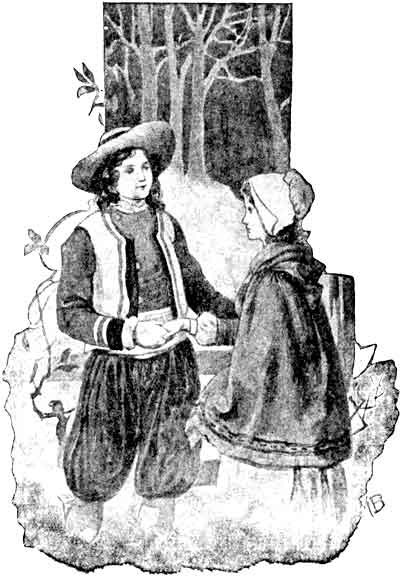
Somewhat surprised at the frank words the maiden had spoken, John made answer: "All thy ways, thy words and meekness of spirit are indeed pleasant to me, but as yet I have no voice to direct me in this [80]matter. When the work which the Lord has appointed for me is ended, I will commune with my own heart and wait for its guidance."
Then Elizabeth said tranquilly: "It is best so. We will not speak further on the matter, but I had to tell thee this, for to-morrow thou art going away across the sea and I know not when I shall see thee again. But, if God wills, thou wilt return again to seek me and will find me still here." And they rode onward in silence to join the others and entered the town in their company.
Thus Elizabeth and John met and parted once more like "Ships that pass in the night, and speak to each other in passing." The quiet life in the homestead went on just as it had done before. Always thoughtful and kind to others, Elizabeth lived and worked on her lonely farm, ever patient and uncomplaining. And Hannah too, urged by her mistress's example, was never idle; early and late she was always to be found at work, washing, scouring, or cooking, till her cheeks grew rosy from her exertions.
She amused herself by teasing Joseph and, though at heart she was really very fond of him, whenever he attempted to make love to her, she would never listen seriously, but always laugh at him and make fun of his clumsy devotion. This was quite unlike the way a demure Puritan maiden should conduct herself, and at[81] times Elizabeth was obliged to chide her housemaid for her light behavior.
Meanwhile John Estaugh had sailed over the sea bearing in his heart a precious secret. He pondered over it, till at length it was borne in upon him that his duty might go hand-in-hand with his inclination, and that even if he accepted this wondrous gift of a true woman's love, he could also follow in the way he deemed the right one. So he returned from his journey, and on the first Sabbath Day after his arrival he rose in the silent assembly and holding Elizabeth's hand, which trembled a little in his strong grasp, he promised, in the presence of the whole congregation, to be true and kind and faithful in all things to his wife. Such were the simple marriage rites of Elizabeth Haddon and John Estaugh.
Then honest Joseph, who thus far had not fared over well in his wooing, ventured to urge Hannah the housemaid to join her lot with his and follow the example of their master and mistress. But although Hannah still said "Nay," she added: "Thee may make believe and see what comes of it, Joseph." So I am inclined to think that she did give in after all.
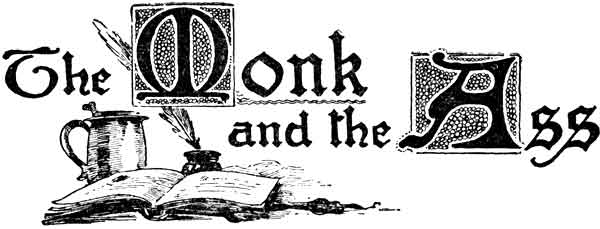

nce upon a time, some centuries ago, two weary Franciscan monks were wending their way, in the hot glare of the noonday sun, to their convent, whose white walls and spires gleamed like a patch of snow on the hillside some distance away.
The first of these monks was named Brother Anthony. He was a spare and silent man, much given to fasting and prayer. His monk's habit hung in loose folds on his thin body, his hair was thin and gray, and he stooped wearily as he walked along. A simple soul was the monk Anthony, accustomed only to listen and obey the commands of others.
Of a very different stamp was his companion, Brother Timothy, large and robust with rosy cheeks and bristling red hair. He was tall and broad shouldered and his robe fitted tightly round his portly form. Brother Timothy had ever a jest on his lips, and the more sober monks were sometimes scandalized at the[83] noise and uproar he created in the convent refectory. Moreover, it was useless to exhort Timothy to cease jesting and study his Mass-book, for the simple reason that the jovial monk had never learned to read.
It was a very hot day. The monks' dark robes were covered with dust and torn by briers, and the two holy men made slow progress owing to the heavy wallets full of provisions which they were carrying on their backs. Now, as they passed the outskirts of a lonely wood, to their surprise they beheld an ass tethered to a tree, and blinking lazily at the passers-by. This donkey was the property of a certain Farmer Gilbert, who had come thither to gather faggots. He had wandered deep into the forest to collect enough wood, leaving his donkey to rest in the shade.
No sooner did Brother Timothy catch sight of the patient animal than he cried out: "See, brother, what a piece of good fortune has befallen us! We will lay our wallets on this creature's back."
This being done, he removed the halter from the ass's neck and proceeded to tether himself to the same tree where the donkey had been tied. Brother Anthony looked on at these queer doings in great amazement, which was not lessened when Brother Timothy broke out into a merry peal of laughter and cried: "Drive the ass before you with your staff to the convent, and, when you arrive there, tell the brethren that you were[84] obliged to leave me at a farm, as I was worn out and ill with fever, and that the farmer lent you his ass to carry our heavy wallets, which are filled with provisions for their use."
Brother Anthony knew quite well that it would be fruitless to try and reason with Brother Timothy when the latter was bent on playing one of his mad pranks, so he made no reply but obeyed in silence. Driving the ass before him, he arrived safely with the wallets at the convent and left his comrade to his fate.
Presently Farmer Gilbert came forth from the wood laden with faggots and stood aghast to see the ponderous body of the friar fastened to the tree where he had left his ass. Dropping his load of wood, he stood open-mouthed and trembling and then hastily crossed himself, for he thought that this was the work of the Evil One.
"Be not amazed," quoth Brother Timothy, "that where you left an ass you should find a poor, half-starved Franciscan friar. Set me free and you shall hear my piteous story."
With shaking fingers the farmer unloosed the rope, and the monk continued: "Although I wear the garb of a holy friar, I am a sinful man. You imagine you have owned an ass, but it was myself, transformed into this shape for the deadly sin of gluttony, and condemned to do penance by feeding on grass and being[85] beaten and starved by your household. Think of the miserable life I have endured, the windy shed which was my home, and the damp and musty straw which formed my bed; my scanty food was given me grudgingly and I have patiently endured toil and blows. But to-day my penance is at an end and I begin life as a monk again."
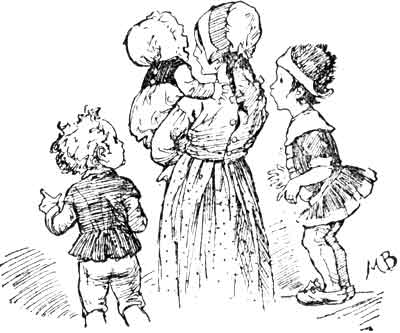
Simple Farmer Gilbert was conscience-stricken at hearing such words as these, and, falling on his knees before the friar, implored his pardon. The deceitful monk, rejoiced to think that his tale had been so readily believed, generously forgave the farmer for his past conduct, and even consented to be his guest for the night as it was getting late and he stood in need of rest.
The farmer led his guest to his humble white-washed cottage, which stood on a hillside covered with fruitful olive trees. Drawing near, they found the farmer's wife, comely Dame Cicely, his children, and[86] his old father waiting the return of the master of the house, and, when the monk's wonderful tale was told anew, they were no less penitent and amazed than the farmer himself had been. Deeply they grieved over the harsh treatment the holy man had endured at their hands, and, poor as they were, set about forthwith to prepare a grand supper to satisfy Brother Timothy's hunger after such a long and rigid fast. The good wife killed her last two fowls, and made them into a salad; then she brought out her best wine and begged her honored guest to fall to.
Brother Timothy played his part well. He ate and drank as though he had been starving for a twelve-month, and, all the while, he talked and laughed without stopping and wagged his red beard, till at length the farmer grew angry with his guest and ventured to reprove him in good round terms.
"Good father," said he, "it is easy to see that for some persons punishment is right and needful. The manner in which you have behaved to-night after your long penance clearly proves that you have but little strength against temptation and shows in what peril you stand of relapsing into your deadly sin of greediness. Take my advice; return to your convent at sunrise to-morrow and there repent, fast and scourge yourself, for you are in great danger of becoming an ass again. Be wise and remain here no longer, or else I may be tempted to use the whip to you, and I should not deal so lightly with you as you would with yourself."
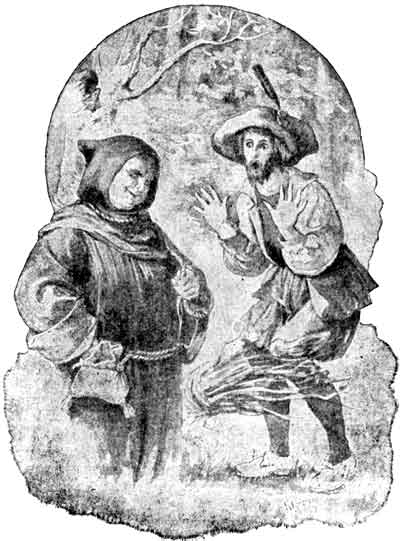
Brother Timothy had the grace to blush deeply at this well-deserved reproof, but wisely made no reply, and soon the whole household sought their beds. The next morning they awoke at sunrise, at the hour when the cock should have crowed, only, as you know, they had eaten him for supper the previous evening. The monk, who had recovered his good spirits, rose betimes, and, having breakfasted, set out in haste, for he heard the distant matin bell ringing from the convent and so made his leave-taking a very brief one.
It was a balmy summer morning, filled with the song of birds and the subdued lowing of cattle; the beautiful Italian countryside looked its loveliest, but Brother Timothy cared naught for all this. His thoughts were concerned only with his own affairs, and it was not till the convent walls appeared before him that he quickened his steps and began to take an interest in what was going on.
As he entered the convent gate, he saw the ass standing patiently there just as he had found him in the wood. Brother Timothy at once hastened to the Abbot and, after telling him a plausible tale of sickness and weariness which had prevented him from returning to the convent on the previous day, he went[89] on to explain that the ass had been sent as a present to the Brotherhood; the owner, who was a wealthy man, had bestowed it on the convent, so that it might ease the poor monks from always carrying such heavy burdens on their journeys to the neighboring village.
Now this was a matter which required careful consideration, and for some days the Abbot thought over in his mind the difficult question of how he should dispose of the gift. On the one hand, it would be pleasant for the monks to be spared so much toil, but, on the other, it would make them lazy and self-indulgent, and the world would find reason for scandal and reproof. So finally he determined to sell the ass, in order to save the expense of his keep, and to put by the money which its sale would fetch. He would save himself from any annoyance and, in addition, gain a substantial sum of money for the Brotherhood.
The ass was forthwith dispatched to the neighboring fair, whither it happened by chance that Farmer Gilbert had come. He soon caught sight of the ass and, coming up, he whispered in its ear: "Alas, good father, I see that my warnings were useless, and that your gluttony has changed you into an ass again." The ass, feeling something tickling its ear, turned round and shook its head as if to contradict what he had just heard.
"I know you well," continued Gilbert, in a loud[90] voice. "You cannot deny that you are the Franciscan friar named Timothy," But the ass still shook its head, and Gilbert continued to argue with the animal till a crowd gathered round them and began to mock and jeer.
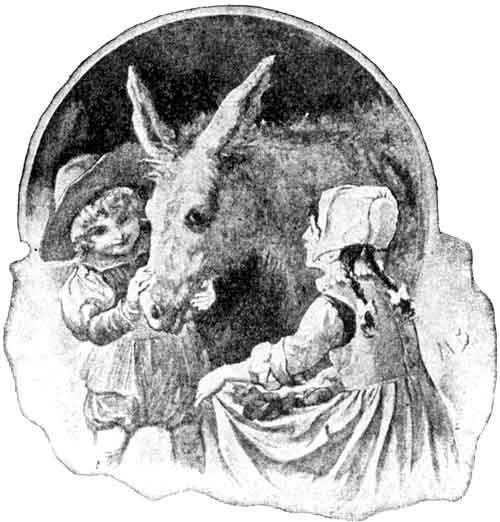
"If this ass is Brother Timothy," they cried, "you ought to buy him and feed him on the tenderest grass. It would surely be an act of charity to show some kind[91]ness to a poor unfortunate who has been transformed into an ass."
The simple farmer took their advice, bought his own ass and led him homeward over hill and dale and, as they went, he exhorted the animal to behave well and be content. The children ran to meet their father and, when they saw what he was leading, they shouted for joy, for they could not understand that this creature was a holy friar, and not their own lost donkey.
"Oh, Brother Timothy," they cried, "we are so glad you have come back to us; we were afraid that you were dead and that we would never see you any more!"
Then they wove green garlands for his neck, patted him and kissed his head, and led him back to his stable. Henceforward, the donkey, who was always known as Brother Timothy, led a life of luxury; he had little work given him to do and so much hay and corn to eat, that he grew ungrateful and vicious. At length Farmer Gilbert lost his patience and said to the ass: "As our kindness is not repaid by good behavior, I shall have to see what a sound thrashing will do."
It would be difficult to tell you of all the vices that this spoiled animal had fallen into; among others was a habit of flinging up his heels, breaking his halter, and running away through woods and over meadows, de[92]fying the efforts of everyone to catch him. But his gravest offense was breaking out of his shed at night and ravaging the cabbage patch. This was too much for even the long-suffering farmer to endure, and he determined to take strong measures to curb the donkey's wickedness, whether the animal were a holy friar or not. So Brother Timothy was sent back again to his old life of toil. He was beaten without mercy, and instead of luxuries and caresses he had to work harder than he had ever done before. And this was not the worst, for as his work grew more his food grew less, till at last the poor creature could only take his revenge on his hard taskmaster by dying.
Great was the lamentation which then uprose, and sad was Farmer Gilbert to think that the unfortunate monk had died without repenting of his sins. Dame Cicely and the children cried for a week, and Farmer Gilbert recounted all the virtues of the deceased and added solemnly: "May Heaven pardon Brother Timothy and keep us from the deadly sin of greed!"
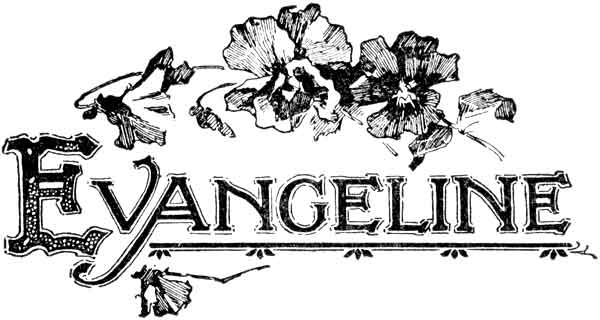
n the land of Acadia, within a fruitful and secluded valley, lay the little village of Grand-Pré. Its inhabitants were a sturdy race of French farmers, hard-working, kind, and generous. The land was exceedingly fruitful, and so freely did these simple farmers give to others that poverty was almost unknown in the village. The pleasant farmhouses had neither locks to the doors nor bars to the windows, but stood open like the hearts of their owners.
At a short distance from the village dwelt the wealthy farmer, Benedict Bellefontaine, an upright and stately man, in spite of his seventy years. With him lived his only daughter, Evangeline, a lovely maiden of seventeen summers, and the pride and joy of his old age. Her black eyes gleamed brightly from beneath the shade of her brown tresses and when, on Sunday[94] mornings she walked down the village street to church, wearing her Norman cap, blue kirtle and earrings, all eyes turned to look at her with admiration, for she was without doubt the most beautiful girl in the whole village.
Of suitors she had many, but none found favor in her eyes save young Gabriel, the son of Basil the blacksmith. Basil and Benedict were old friends, and their children had grown up together almost as brother and sister, learning the same lessons and sharing the same sports and pastimes. As they grew up, their childish love deepened and strengthened, and now, with the warm approval of their respective fathers, their marriage was soon to take place.
One evening, Benedict was sitting by his fireside, and near him Evangeline was busy spinning, for in those days it was the duty of an industrious housewife to make all the linen which would be required for her future home. Presently the latch was lifted and in came the stalwart blacksmith with his son. The two elders took their usual seats near the hearth and smoked their pipes, while the young couple stood apart by the window and talked of their future life.
Said Basil: "I do not like the look of things just now. English ships with cannon pointed against us are at anchor in our harbor. We do not yet know whether their intention be good or ill, but we are all[95] summoned to appear in the church to-morrow and hear his Majesty's command, which is to be made the law of the land."
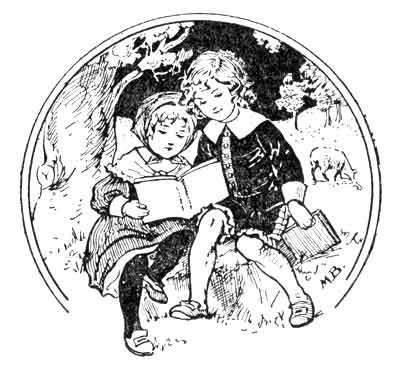
"Nonsense," replied Benedict, "you look on present circumstances too gloomily. After all, since this land now belongs to the English, it is only natural that we should have to obey fresh laws. We are an honest and law-abiding people and they cannot intend to harm us."
"The English have not forgotten that we helped our kinsmen, the French, against them," replied the blacksmith. "Many of the villagers fear they mean to harm us, and have already fled to the forest, taking with them all the weapons they could lay hands on."
"Fear no evil, my friend," said the jovial farmer. "To-night, at any rate, let no shadow of sorrow fall on this house, for we are assembled here to draw up[96] our children's marriage contract. Their house is built, the barns filled with hay, and all is in readiness for them."
As he spoke a knock was heard at the door and the worthy notary, Père Leblanc, came in. The disquieting news in the village was discussed anew, and the notary said: "Man is unjust, but God is just, and justice finally triumphs. When I was taken captive and lay imprisoned in a French fort I was often consoled by an old story which ran thus: 'Once in an ancient city, whose name I cannot recall, poised on a column, stood a brazen statue of Justice. In her right hand she held a sword, and in her left a pair of scales. The birds of the air had no fear of the sword which flashed and glittered in the sunshine, and some of the boldest among them even built their nests in the scales. Now it chanced that a necklace of pearls was lost in a nobleman's palace and suspicion fell on a young maid-servant. Although her guilt could not be proved, she was condemned to death, and her execution took place at the foot of the statue of Justice. But as her innocent spirit rose to heaven, lo! a terrible storm swept over the city and struck the statue with such force that the scales of the balance were hurled down on to the pavement. When they were picked up, in the hollow was found a magpie's nest, into the clay sides of which the pearl necklace was interwoven.'"
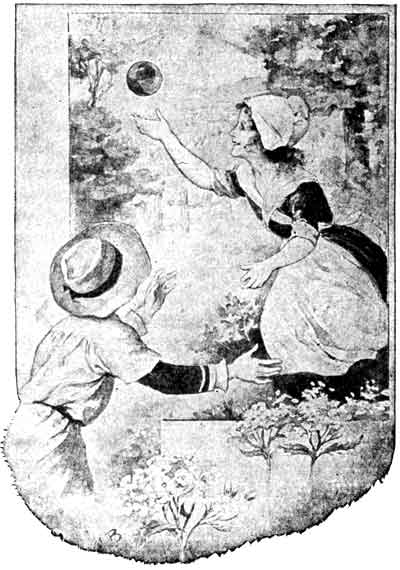
The blacksmith was silent, though not convinced by the notary's tale, but he said nothing further on the subject. The notary produced his papers and ink-horn and drew out in due form the marriage contract between Gabriel and Evangeline; then, pocketing the substantial fee which the farmer offered him, he drank the young couple's health and withdrew. The old men settled down to their customary game of draughts, and the lovers sat in the window-seat watching the moon rise and the stars come out one by one. At nine the village curfew rang, and the guests rose up and departed.
The next morning a betrothal feast was held in Benedict's orchard. The young men and maidens danced gayly to the sound of old Michael's fiddling, and of them all no maiden was so fair as Evangeline, no youth so handsome as Gabriel. Thus was the morning passed, and soon the church-bells and the beat of drums summoned the people to the appointed meeting-place. The women were bidden to wait in the churchyard, while the men thronged into the church. The guard came marching from the English ships, and, when they had entered the sacred building, the heavy doors were fastened and the crowd waited eagerly to hear what was coming. Speaking from the steps of the altar, the Commander said: "You are summoned here to-day by his Majesty the King's command, and[99] he has given me a painful duty to perform. The will of our monarch is that all your lands, dwellings, and cattle be forfeited to the crown, and that you yourselves shall be transported to other lands. And now I declare you my prisoners."
Loud was the clamor of sorrow and anger which uprose at these words and Basil the blacksmith shouted wildly: "Down with the tyrants of England!" In the midst of the angry tumult the door of the chancel opened and Father Felician entered the church. Ascending the steps of the altar, the good priest made a gesture to command silence and all were subdued by his noble words: "Even of our enemies let us say, 'O Father, forgive them!'" Then he calmly conducted the evening service, and never were prayers more earnestly said than on that dreadful night.
For four days the men were imprisoned in the church, while their womenfolk, sick with sorrow, waited in their homes. On the fifth day a long procession of women and children came, driving in ponderous wagons laden with their household goods, down to the seashore. Then the church doors were unbarred, and, pale with grief and imprisonment, the Acadian peasants marched to the harbor under the escort of soldiers. Evangeline was on the watch for her dear ones; to her lover she whispered words of encouragement, and strove to cheer her father, though[100] sadly affrighted by his dejection and the way he seemed suddenly to have grown much older.
At the place of embarking the greatest confusion prevailed. Small boats plied between the shore and the ships and thus wives were torn from their husbands and mothers, too late, saw their children left behind. Half the task was not finished when night came on. Basil and Gabriel were among those who were taken to the ships, but Evangeline and her father were left standing in despair on the shore.
Fires were kindled on the beach, and Father Felician wandered from group to group, consoling and blessing the poor homeless people. As he paused where Evangeline and her father were encamped, a sudden flare filled the sky behind them. All eyes were turned in that direction, and the whole village was seen to be in flames. Overwhelmed with sorrow the priest and the maiden gazed at the scene of terror, but Benedict uttered no word, and, when at last they turned to look at him, he had fallen to the ground and lay there dead. Separated from her lover and now alone in the world, the poor girl's courage at length failed her and her grief was piteous to behold.
The next morning the old farmer received a hasty burial on the seashore, and the remainder of the exiles were carried to the ships and transported to far distant lands.
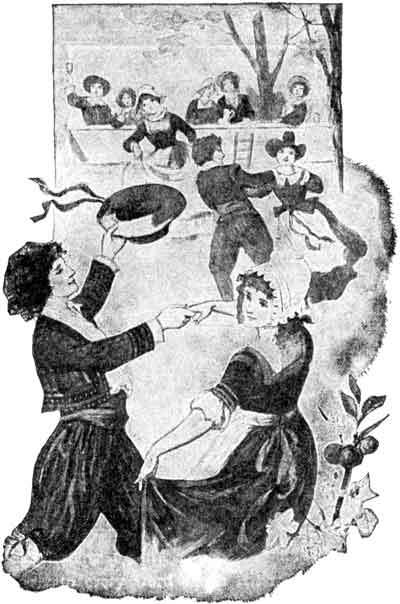
Many years had passed away since the burning of the village of Grand-Pré, and the exiles had been scattered far asunder. Among them a maiden, patient and meek in spirit, waited and wandered. Sometimes she lingered in towns, at others she passed through the country and wandered into churchyards, gazing sadly at the crosses and tombstones, but never did she remain long in the same place. It was Evangeline searching for her lover, and, though many sought to dissuade her from her quest, and urged her to listen to the wooing of her faithful suitor Baptista Leblanc, the notary's son, she only answered sadly: "I cannot, for whither my heart has gone, there follows my hand." And in all her doings she was upheld and cheered by her faithful friend, the priest Felician. Wherever she went she asked for news of Gabriel, and at last she found out that he and his father had become famous hunters, and had been met with on one of the vast prairies, but she was never able to trace his movements.
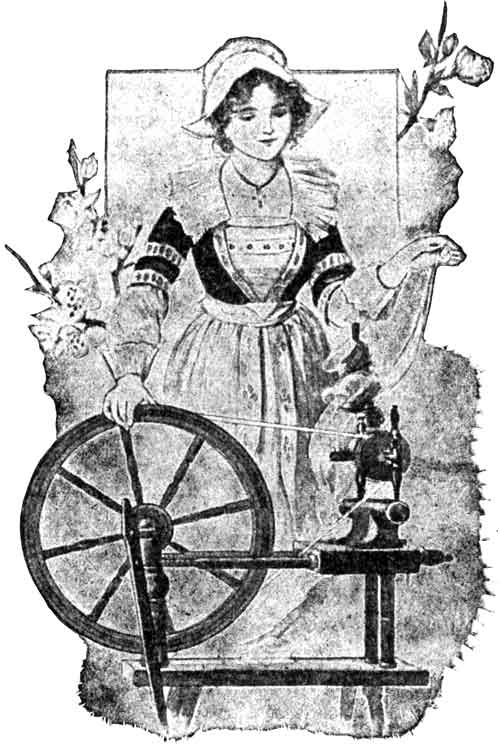
Still she journeyed onward and onward till, one May, she joined a band of Acadian exiles who were sailing in a cumbrous boat down the broad river Mississippi. They were seeking for their kinsmen who, it was rumored, had settled down as farmers in that fertile district. Day after day the exiles glided down the river, and night after night they encamped on its banks and slept by the blazing camp-fires which they kindled. One night—if only Evangeline had known it—a boat rowed by hunters and trappers, Gabriel among them, passed by close to their camp. But the[104] exiles' boat was hidden among the willows and they themselves screened from sight by thick shrubs, so the hunters sped northward and their passing was unheeded. Only when the sound of their oars had died away, the maiden awoke and said to the priest: "Father Felician, something tells me that Gabriel is near me. Chide me not for this foolish fancy."
"Not far to the south," answered the faithful priest, "are the towns of St. Maur and St. Martin, where many of our kinsfolk have settled. There in that beautiful land, which its inhabitants call the Eden of Louisiana, the bride shall surely be restored to her bridegroom."
Full of hope, the travelers continued their journey, and presently arrived at a herdsman's house which stood in a lovely garden close to the river. The owner himself, mounted on horseback, was watching his numerous herds which were grazing in the meadows around him. As he turned towards his house, he caught sight of the maiden and the priest coming toward him. With a cry of joy he sprang from his saddle and hastened towards them, and then the travelers saw that it was none other than Basil the blacksmith. You can imagine how cordial were the greetings, how numberless the questions and answers that passed between them. Only Evangeline grew silent and thoughtful when Gabriel did not appear, and at length Basil said, "If you came[105] by way of the lakes, how is it that you did not meet my son's boat?"
"Gone, is Gabriel gone?" murmured Evangeline piteously; she could not hide her disappointment, and shed bitter tears.
"Be of good cheer, my child," returned honest Basil, "it is only to-day he went from here. He grew moody and restless ever thinking of thee, till at length he could no longer endure this quiet existence. Therefore I let him go among the Indians, hoping thus to divert his mind from his troubles. Early to-morrow thou and I will set out after him, and I doubt not but we shall overtake him and bring him back to his friends."
A sound of many voices was now heard, and the other travelers came up joyously led by Michael the fiddler, who had lived with Basil since their exile, having no other task than that of cheering his companions by his merry music. Basil invited all the travelers to sup with them, and greatly did they marvel at the former blacksmith's wealth and many possessions. When they were seated at the table, Basil told his friends of the beauty of the country and the fertility of the soil, and, when he added that land might be had for the asking, they all resolved to settle there and help to form the new Acadian colony.
On the morrow, according to his promise, Basil set out to overtake his son, and Evangeline went with him.[106] Day after day they journeyed onward through a wild and desolate country, but could hear no tidings of the traveler. At length they arrived at the inn of a little Spanish town, where they heard that Gabriel had left that very place the previous day and had set out with his horses and guides for the prairies.
Basil and Evangeline determined not to give up their search, and, hiring some Indian guides, they followed in the direction which Gabriel had taken. One evening as they were sitting by their camp-fire, there entered an Indian woman whose face bore the marks of heavy grief. She was returning from the far distant hunting-grounds, where her husband had been cruelly murdered by a hostile tribe. Touched by her sad story, the white people offered her food and a night's shelter, which she gratefully accepted. After the evening meal was over, Evangeline and the stranger sat apart, and the maiden, in her turn, related to the other the story of her lost lover and her other misfortunes.
Early the next day the march was resumed, and as they journeyed along, the Indian woman said: "On the western slope of these mountains dwells the Black Robe, Chief of the Mission. He talks to the people of their Heavenly Father and they give heed to his teaching."
Then said Evangeline: "Let us go to the Mission, for there good tidings await us."[107]
So they turned their steeds thither, and just as the sun was setting they reached a green meadow by the riverside. There the preacher knelt in prayer and with him a multitude of people. The travelers joined reverently in the prayers, and when the service was over, the priest came to welcome the strangers and offered them shelter and a share of his frugal meal of wheaten cakes and spring water. Afterwards they told the priest their story, and he said: "Only six days ago Gabriel sat by my side and told me this same sad tale, then he continued his journey. He has gone far to the north, but in autumn when the hunting is over he will return to the Mission."
Then Evangeline pleaded: "Let me remain with thee, for my soul is sad and afflicted." This seemed to the others a wise thing to do, so thus it was arranged. Early on the morrow Basil returned homewards and Evangeline stayed on at the Mission.
Slowly and wearily the days passed by, and Evangeline lived and worked at the Mission till autumn drew on. But still Gabriel did not come, and the maiden lived on there till the following summer. Then a rumor reached her ears that Gabriel had encamped in a far distant forest, and Evangeline took leave of her friends at the Mission and set forth again to seek her lover, but when she reached the hunter's lodge she found it deserted and fallen to ruin.[108]
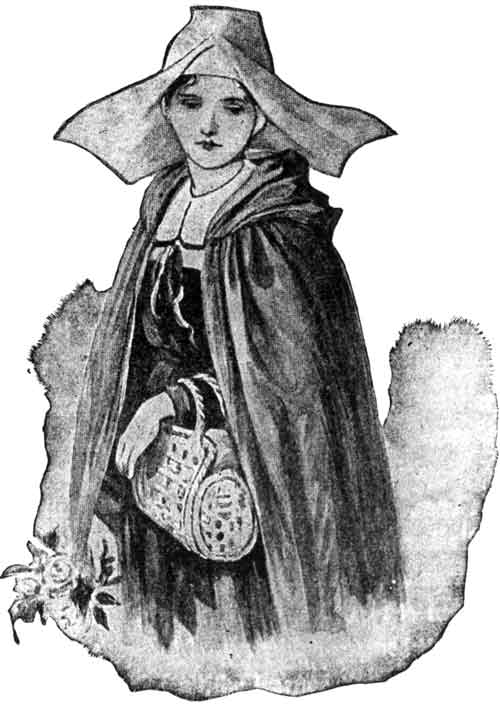
And now her weary pilgrimage began anew. Her wanderings led her through towns and villages, now she tarried a while in mission tents, now she tended the sick and wounded in the camp of a battlefield. As the years went on, her beauty faded and streaks of gray appeared in her dark hair. She was fair and young when[109] she began her long journey, faded and old when it ended in disappointment.
At length poor Evangeline grew weary of wandering through strange places and resolved to end her days in the city founded by the great preacher, Penn. Here other of the Acadian exiles had settled, and Evangeline felt that there was something homelike in the pleasant streets of the little city and the friendly speech of the Quakers.
There for many years she dwelt as a Sister of Mercy, bringing hope and comfort to the poor and suffering ones. Then it came to pass that a terrible pestilence fell on the city and thousands perished. The poor crept away to die in the almshouse, and thither by night and day came the Sister of Mercy to tend them.
One Sabbath morning Evangeline passed through the deserted streets and entered the gates of the almshouse. On her way she paused to pluck some flowers from the garden, that the dying might be comforted by their fragrance. As she mounted the stairs she heard the chime of church-bells and the sound of distant psalm-singing, and a deep calm came over her soul, for something within her seemed to say, "At length thy trials are ended!"
Suddenly, as she was passing down the wards, she stood still and uttered a cry of anguish. On the pallet before her lay an old man with long gray hair, and, as[110] she gazed, she saw that this was none other than her lover, Gabriel. She knelt by his bedside and the dying man opened his eyes and tried to whisper her name, but his strength was spent, and with one last look he passed away from her.
Evangeline's weary quest was over; sweetly and patiently she took up her life again and henceforth lived only for others. And now, in the little Catholic churchyard of this far-away city, side by side the lovers are sleeping.


ot far from the fair town of Florence lived a wondrously beautiful maiden named Monna Giovanna. Of lovers she had no lack, but the two whom she most favored were gallant Ser Federigo, and his rival, Ser Enrico.
Ser Federigo had inherited a great fortune and large estates from his father, and, anxious to win favor in the sight of his lady, he lavished his wealth in costly banquets and tournaments, never stopping to consider whether she would approve of his extravagance. So reckless was Ser Federigo that at last all his fortune was spent, and in order to obtain fresh supplies he sold his estates, reserving only one small farm for himself, and wasted all that money also.
Monna Giovanna by no means approved of her wooer's extravagance—she refused his gifts, and disdained his banquets. "A spendthrift will not make a prudent husband," thought she, and so she married the more[112] careful Ser Enrico, and for some years lived very happily with him in a distant land.
Meanwhile Ser Federigo, become a sadder and wiser man, retired to his little farm on the outskirts of the city, taking with him his falcon, the only creature which remained true to him, for all his former friends shunned him in his poverty.
One hot summer's morning, weary from working in his plot of garden, Ser Federigo sat on a wooden bench beneath the shelter of his cottage eaves thinking dreamily of the past and of the happiness which might have been his, while the falcon by his side was dreaming also. Suddenly he started up on his perch, shook his bells, and looked eagerly at his master as if to say, "Ser Federigo, shall we not go a-hunting?" But his master's thoughts were far away, and he did not stir. Presently he looked up in amazement. Peeping through the trellis he saw a lovely child, a boy with golden tresses and large wondering eyes. Without a glance at the man, the child walked straight up to the bird and said coaxingly, "Beautiful falcon, I wish I might hold you on my wrist, or see you fly."
Ser Federigo started, for the child's voice seemed strangely familiar to him, and, laying his hand gently on the shining head, he asked, "Who is your mother, my fair boy?"
"Monna Giovanna," replied the child. "Will you[113] let me stay a little while and play with your falcon?"
"Indeed I will, my child, but first tell me, where do you live?"
"Just beyond your garden wall," was the reply. "In the great house hidden behind those tall poplar trees."
So the boy chattered on, and Ser Federigo took him on his knee and told him stories of the noble falcon, and soon all three became close friends.
As the days went on Ser Federigo set himself to find out why it was that his lady had returned to her native land, and he discovered that Monna Giovanna had been left a widow after a few years of marriage, and that she had come with a friend and her only child to pass the summer quietly in her grand villa overlooking the Arno. Rarely, or never, did the widow lady go beyond the grounds of her villa. Clad in sable robes she paced her stately halls, or read and worked with her friend, her one delight to see her boy growing in health and strength and watch over this treasure still left to her.
The boy loved his free country life and spent the days racing up and down the terraces, chasing the screaming peacocks or climbing the garden trellises to pluck the ripe fruit. But his chief pastime was to watch the flight of a swift falcon which sometimes soared into sight above the tall poplars, and at others[114] swooped down to earth at his master's call. The child had often wondered who the bird's master might be, and one morning he found out that the pair he sought dwelt in the little cottage-farm a short distance from his own home.
The child came several times to see the falcon. Suddenly his visits ceased, but Ser Federigo had no inkling of the reason. The widow's only child had fallen ill, and was pining away from some unknown malady. His mother would not be comforted; she saw her darling already lying dead before her distracted gaze, and no physician could give her any hope for his cure. Sitting by the invalid's bedside she cried to him, "Is there anything I can do to comfort thee, my child?"
At first the child remained silent, but when she besought him again and again to tell her if there was anything on earth she could obtain for him which might cause him to forget his suffering, he replied, "Yes, there is one thing I want. I pray you give me Ser Federigo's falcon for my own!"
The astonished mother could make no reply. Even for her darling's sake she felt she could not ask such a favor from the lover she had once treated with scorn. Besides, though she knew that any request of hers would be at once granted by him, she knew also that the falcon was renowned as the finest bird throughout the countryside, as well as being the joy and pride of[115] his master's heart. But the boy was fretful and restless, and, fearing to thwart his whim lest his life should depend on it, the poor mother promised to go and ask for the falcon on the very next day.
"Will you promise faithfully to go, mother?" asked the boy.
"I will, indeed," replied the distracted lady, and, soothed by her words, the child fell into a refreshing sleep.
The morrow was a bright September day, and Monna Giovanna felt hope revive within her heart as she gazed on her child still peacefully sleeping. The birds were singing sweetly and the dew lay heavy on the grass as two lovely ladies, clothed in hoods and cloaks, passed through the garden-gate into the woods, where the trees had just donned their autumn dress of russet and gold. One of these ladies had her rich dark hair closely covered by her hood. Her eyes were wet with tears, but her face was only made more beautiful by its look of deep sorrow. Her companion was a young girl who walked with light steps, her hood thrown back, and her hair shining with its wealth of gold; her cheeks were tinted like the apple-blossom, and her heart full of joyous thoughts. These were Monna Giovanna and her friend, who, with thoughts intent on their errand, hastened towards the little farm.
They found Ser Federigo digging the ground like[116] Adam of old, and when he beheld these fair ladies, his garden seemed to become a second Eden and the river, flowing by, like the stream which watered Paradise.
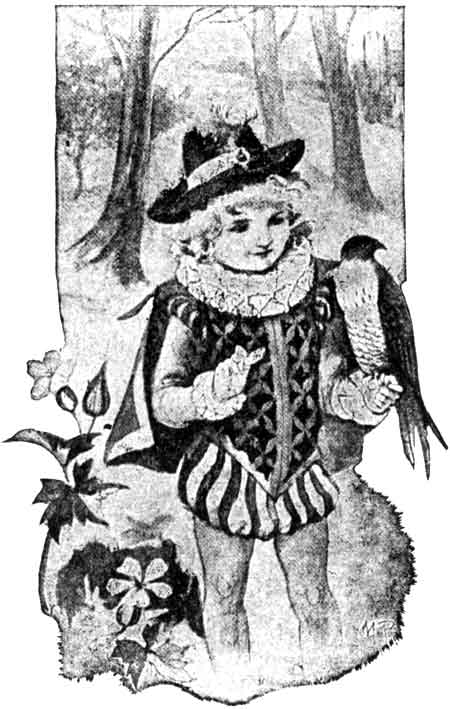
Beautiful as was Monna Giovanna's young companion, Ser Federigo had no eyes for anyone but his dear lady, who, at first doubtful as to how she should begin her errand, soon raised her stately head and addressed him in kindly tones.[117]
"Ser Federigo," said she, "I and my companion come hither to see you in friendship, trusting by this means to make some amends for my unkindness to you in the past. In former days I would not so much as cross the threshold of your door; I refused your banquets and rejected your gifts. But this morning I am here, self-invited, to put your generous nature to the test, and therefore ask if we may breakfast with you beneath your vine?"
Humbly Ser Federigo made reply: "Speak not of your unkindness to me, for if there is within me any good or generous feeling it is to you I owe it, and this gracious favor you do me in seeking me here is sufficient to outweigh all my sorrows and regrets of former years."
After a little further talk had passed between them, Ser Federigo asked his guests to wait in his garden for a brief space while he went to give orders for breakfast. As he entered his cottage his thoughts dwelt regretfully on the gold and silver plate and the ruby glass which had once been his, and it vexed him sorely that his humble abode was lacking in every luxury.
Matters were even worse than the poor host had anticipated; he searched every cupboard and ransacked every shelf, but could find nothing. Then he summoned the maid and asked why it was that provisions had failed them. "The Signor forgets that he did not[118] hunt to-day," replied the girl. "We have nothing but bread and wine in the house, and fruit from the garden."
Then suddenly the falcon shook its bells and looked knowingly at his master as much as to say, "If anything is wanted, I am here!"
"Yes, everything is wanted, my gallant bird," cried his master, and without more ado he seized hold of the poor creature and wrung its neck. Grieved as he was at being forced to sacrifice his only friend, his master had no time to mourn his untimely end. Hastily a snow-white cloth was spread on the rough table, and on it was laid a loaf of bread flanked by purple grapes and fragrant peaches; in the midst of these a flask of wine wreathed with bright autumnal flowers, and finally the falcon, stuffed with cloves and spice, was cooked and served to eke out the humble banquet.
When all was ready the lady and her companion entered the cottage, and to Ser Federigo's dazzled gaze everything seemed transformed. The little room became a stately banqueting-hall, the rustic chair on which his lady sat was transformed into a throne, and the poor falcon seemed a peacock or a bird of paradise.
When the repast was ended they rose and passed into the garden again, and then Monna Giovanna spoke in this wise to her host: "Though you are too[119] courteous to show surprise that I come to you in this friendly manner after we have been parted so many years, I know you must wonder at my reason for doing so. You have no children, so you cannot know the anguish a mother feels when her child is lying ill, nor how eager she is to anticipate his every wish. My only child is dying, Ser Federigo, and I have come to beg of you the one thing which may save his life. It is your falcon, your only treasure, that I beseech you to give my child, though it grieves me to the heart to demand such a precious gift from your hands."
Ser Federigo listened with tears of love and pity in his eyes, then sadly answered, "Alas, dear lady, how gladly would I have granted what you ask had you but expressed this wish one short hour ago. But, thinking I could best do honor to my guests by sacrificing what was most dear to me, I slew my gallant falcon to provide you with a fitting repast."
Slowly the lady turned aside her head, grieved to think that this noble knight had slain his cherished falcon for her sake, and yet glad of this proof of his devotion. But her mind was now filled with alarm, for she must return empty-handed to her sick child; so, taking a hasty farewell of their host, the ladies sadly made their way homewards.
The mother's fears were only too well founded. Three days later Ser Federigo heard the tolling of the[120] passing-bell from the chapel on the hill, and, as he breathed a prayer, "Alas! her child is dead," he murmured.
But happier times were in store for the bereaved lady and her faithful lover. Touched by his devotion Monna Giovanna plighted her troth with Ser Federigo, and by Christmas time the little farm was deserted, and a wedding-feast was held in the grand villa on the hill. Once more Monna Giovanna sat upon the rustic chair which had been brought from the cottage, but something had been added. On the chair-back was perched a wooden image of the gallant falcon, and round the cage Ser Federigo had caused this inscription to be carved: "All things come round to him who will but wait."
A new series for outdoor boys. Every lad who likes Baseball, Football and other outdoor sports is going to be a friend of Tommy Tiptop—that is, if he reads these stories, and he would if he knew what was in store for him.
Never was there a boy like Tommy Tiptop for doing things. Tommy could not be still a minute, and although only ten years of age he organized a baseball club, a football eleven, went into a winter camp, and did other things too numerous to mention.
For sale at all book stores or sent postpaid
upon receipt of price by the publishers.
The doings of real, live boys between the ages of 9 and 12.
Here is a story full of thrills about three boys that lived on the edge of a large lake. They have plenty of fun fishing, swimming and sailing, etc., and one day while sailing their boat, "The Puff," she capsized and drifted to an island in the lake where they play Robinson Crusoe until rescued.
The great desire of Sammy Brown and his chums to find a treasure leads them into many adventures, gets them lost and finally discloses the treasure—but not the one for which they were searching.
Adventure-loving boys should not miss this great story.
Primary and Grammar School life affords boys plenty of fun, and Bob Bouncer's schooldays are "brimfull" of just such fun, adventures and some rivalries.
Bob Bouncer was a boy with red blood in his veins, and you should read this story of his doings.
For Sale at all book stores or sent postpaid upon receipt of price by the publishers.
These stories have been told over the telephone nightly to thousands of children. The urgent demand has led us to publish them in book form for the first time.
Get acquainted with the Trippertrots, you will not regret it. Read how they ran away and how they got back, the wonderful things they saw and the wonderful things they did. They will grip you and hold you interested and amazed to the very end.
For Sale at all book stores or sent postpaid
upon receipt of price by the publishers.
End of Project Gutenberg's The Children's Longfellow, by Doris Hayman
*** END OF THIS PROJECT GUTENBERG EBOOK THE CHILDREN'S LONGFELLOW ***
***** This file should be named 28352-h.htm or 28352-h.zip *****
This and all associated files of various formats will be found in:
http://www.gutenberg.org/2/8/3/5/28352/
Produced by Sankar Viswanathan, D Alexander, Juliet
Sutherland, and the Online Distributed Proofreading Team
at http://www.pgdp.net
Updated editions will replace the previous one--the old editions
will be renamed.
Creating the works from public domain print editions means that no
one owns a United States copyright in these works, so the Foundation
(and you!) can copy and distribute it in the United States without
permission and without paying copyright royalties. Special rules,
set forth in the General Terms of Use part of this license, apply to
copying and distributing Project Gutenberg-tm electronic works to
protect the PROJECT GUTENBERG-tm concept and trademark. Project
Gutenberg is a registered trademark, and may not be used if you
charge for the eBooks, unless you receive specific permission. If you
do not charge anything for copies of this eBook, complying with the
rules is very easy. You may use this eBook for nearly any purpose
such as creation of derivative works, reports, performances and
research. They may be modified and printed and given away--you may do
practically ANYTHING with public domain eBooks. Redistribution is
subject to the trademark license, especially commercial
redistribution.
*** START: FULL LICENSE ***
THE FULL PROJECT GUTENBERG LICENSE
PLEASE READ THIS BEFORE YOU DISTRIBUTE OR USE THIS WORK
To protect the Project Gutenberg-tm mission of promoting the free
distribution of electronic works, by using or distributing this work
(or any other work associated in any way with the phrase "Project
Gutenberg"), you agree to comply with all the terms of the Full Project
Gutenberg-tm License (available with this file or online at
http://gutenberg.org/license).
Section 1. General Terms of Use and Redistributing Project Gutenberg-tm
electronic works
1.A. By reading or using any part of this Project Gutenberg-tm
electronic work, you indicate that you have read, understand, agree to
and accept all the terms of this license and intellectual property
(trademark/copyright) agreement. If you do not agree to abide by all
the terms of this agreement, you must cease using and return or destroy
all copies of Project Gutenberg-tm electronic works in your possession.
If you paid a fee for obtaining a copy of or access to a Project
Gutenberg-tm electronic work and you do not agree to be bound by the
terms of this agreement, you may obtain a refund from the person or
entity to whom you paid the fee as set forth in paragraph 1.E.8.
1.B. "Project Gutenberg" is a registered trademark. It may only be
used on or associated in any way with an electronic work by people who
agree to be bound by the terms of this agreement. There are a few
things that you can do with most Project Gutenberg-tm electronic works
even without complying with the full terms of this agreement. See
paragraph 1.C below. There are a lot of things you can do with Project
Gutenberg-tm electronic works if you follow the terms of this agreement
and help preserve free future access to Project Gutenberg-tm electronic
works. See paragraph 1.E below.
1.C. The Project Gutenberg Literary Archive Foundation ("the Foundation"
or PGLAF), owns a compilation copyright in the collection of Project
Gutenberg-tm electronic works. Nearly all the individual works in the
collection are in the public domain in the United States. If an
individual work is in the public domain in the United States and you are
located in the United States, we do not claim a right to prevent you from
copying, distributing, performing, displaying or creating derivative
works based on the work as long as all references to Project Gutenberg
are removed. Of course, we hope that you will support the Project
Gutenberg-tm mission of promoting free access to electronic works by
freely sharing Project Gutenberg-tm works in compliance with the terms of
this agreement for keeping the Project Gutenberg-tm name associated with
the work. You can easily comply with the terms of this agreement by
keeping this work in the same format with its attached full Project
Gutenberg-tm License when you share it without charge with others.
1.D. The copyright laws of the place where you are located also govern
what you can do with this work. Copyright laws in most countries are in
a constant state of change. If you are outside the United States, check
the laws of your country in addition to the terms of this agreement
before downloading, copying, displaying, performing, distributing or
creating derivative works based on this work or any other Project
Gutenberg-tm work. The Foundation makes no representations concerning
the copyright status of any work in any country outside the United
States.
1.E. Unless you have removed all references to Project Gutenberg:
1.E.1. The following sentence, with active links to, or other immediate
access to, the full Project Gutenberg-tm License must appear prominently
whenever any copy of a Project Gutenberg-tm work (any work on which the
phrase "Project Gutenberg" appears, or with which the phrase "Project
Gutenberg" is associated) is accessed, displayed, performed, viewed,
copied or distributed:
This eBook is for the use of anyone anywhere at no cost and with
almost no restrictions whatsoever. You may copy it, give it away or
re-use it under the terms of the Project Gutenberg License included
with this eBook or online at www.gutenberg.org
1.E.2. If an individual Project Gutenberg-tm electronic work is derived
from the public domain (does not contain a notice indicating that it is
posted with permission of the copyright holder), the work can be copied
and distributed to anyone in the United States without paying any fees
or charges. If you are redistributing or providing access to a work
with the phrase "Project Gutenberg" associated with or appearing on the
work, you must comply either with the requirements of paragraphs 1.E.1
through 1.E.7 or obtain permission for the use of the work and the
Project Gutenberg-tm trademark as set forth in paragraphs 1.E.8 or
1.E.9.
1.E.3. If an individual Project Gutenberg-tm electronic work is posted
with the permission of the copyright holder, your use and distribution
must comply with both paragraphs 1.E.1 through 1.E.7 and any additional
terms imposed by the copyright holder. Additional terms will be linked
to the Project Gutenberg-tm License for all works posted with the
permission of the copyright holder found at the beginning of this work.
1.E.4. Do not unlink or detach or remove the full Project Gutenberg-tm
License terms from this work, or any files containing a part of this
work or any other work associated with Project Gutenberg-tm.
1.E.5. Do not copy, display, perform, distribute or redistribute this
electronic work, or any part of this electronic work, without
prominently displaying the sentence set forth in paragraph 1.E.1 with
active links or immediate access to the full terms of the Project
Gutenberg-tm License.
1.E.6. You may convert to and distribute this work in any binary,
compressed, marked up, nonproprietary or proprietary form, including any
word processing or hypertext form. However, if you provide access to or
distribute copies of a Project Gutenberg-tm work in a format other than
"Plain Vanilla ASCII" or other format used in the official version
posted on the official Project Gutenberg-tm web site (www.gutenberg.org),
you must, at no additional cost, fee or expense to the user, provide a
copy, a means of exporting a copy, or a means of obtaining a copy upon
request, of the work in its original "Plain Vanilla ASCII" or other
form. Any alternate format must include the full Project Gutenberg-tm
License as specified in paragraph 1.E.1.
1.E.7. Do not charge a fee for access to, viewing, displaying,
performing, copying or distributing any Project Gutenberg-tm works
unless you comply with paragraph 1.E.8 or 1.E.9.
1.E.8. You may charge a reasonable fee for copies of or providing
access to or distributing Project Gutenberg-tm electronic works provided
that
- You pay a royalty fee of 20% of the gross profits you derive from
the use of Project Gutenberg-tm works calculated using the method
you already use to calculate your applicable taxes. The fee is
owed to the owner of the Project Gutenberg-tm trademark, but he
has agreed to donate royalties under this paragraph to the
Project Gutenberg Literary Archive Foundation. Royalty payments
must be paid within 60 days following each date on which you
prepare (or are legally required to prepare) your periodic tax
returns. Royalty payments should be clearly marked as such and
sent to the Project Gutenberg Literary Archive Foundation at the
address specified in Section 4, "Information about donations to
the Project Gutenberg Literary Archive Foundation."
- You provide a full refund of any money paid by a user who notifies
you in writing (or by e-mail) within 30 days of receipt that s/he
does not agree to the terms of the full Project Gutenberg-tm
License. You must require such a user to return or
destroy all copies of the works possessed in a physical medium
and discontinue all use of and all access to other copies of
Project Gutenberg-tm works.
- You provide, in accordance with paragraph 1.F.3, a full refund of any
money paid for a work or a replacement copy, if a defect in the
electronic work is discovered and reported to you within 90 days
of receipt of the work.
- You comply with all other terms of this agreement for free
distribution of Project Gutenberg-tm works.
1.E.9. If you wish to charge a fee or distribute a Project Gutenberg-tm
electronic work or group of works on different terms than are set
forth in this agreement, you must obtain permission in writing from
both the Project Gutenberg Literary Archive Foundation and Michael
Hart, the owner of the Project Gutenberg-tm trademark. Contact the
Foundation as set forth in Section 3 below.
1.F.
1.F.1. Project Gutenberg volunteers and employees expend considerable
effort to identify, do copyright research on, transcribe and proofread
public domain works in creating the Project Gutenberg-tm
collection. Despite these efforts, Project Gutenberg-tm electronic
works, and the medium on which they may be stored, may contain
"Defects," such as, but not limited to, incomplete, inaccurate or
corrupt data, transcription errors, a copyright or other intellectual
property infringement, a defective or damaged disk or other medium, a
computer virus, or computer codes that damage or cannot be read by
your equipment.
1.F.2. LIMITED WARRANTY, DISCLAIMER OF DAMAGES - Except for the "Right
of Replacement or Refund" described in paragraph 1.F.3, the Project
Gutenberg Literary Archive Foundation, the owner of the Project
Gutenberg-tm trademark, and any other party distributing a Project
Gutenberg-tm electronic work under this agreement, disclaim all
liability to you for damages, costs and expenses, including legal
fees. YOU AGREE THAT YOU HAVE NO REMEDIES FOR NEGLIGENCE, STRICT
LIABILITY, BREACH OF WARRANTY OR BREACH OF CONTRACT EXCEPT THOSE
PROVIDED IN PARAGRAPH F3. YOU AGREE THAT THE FOUNDATION, THE
TRADEMARK OWNER, AND ANY DISTRIBUTOR UNDER THIS AGREEMENT WILL NOT BE
LIABLE TO YOU FOR ACTUAL, DIRECT, INDIRECT, CONSEQUENTIAL, PUNITIVE OR
INCIDENTAL DAMAGES EVEN IF YOU GIVE NOTICE OF THE POSSIBILITY OF SUCH
DAMAGE.
1.F.3. LIMITED RIGHT OF REPLACEMENT OR REFUND - If you discover a
defect in this electronic work within 90 days of receiving it, you can
receive a refund of the money (if any) you paid for it by sending a
written explanation to the person you received the work from. If you
received the work on a physical medium, you must return the medium with
your written explanation. The person or entity that provided you with
the defective work may elect to provide a replacement copy in lieu of a
refund. If you received the work electronically, the person or entity
providing it to you may choose to give you a second opportunity to
receive the work electronically in lieu of a refund. If the second copy
is also defective, you may demand a refund in writing without further
opportunities to fix the problem.
1.F.4. Except for the limited right of replacement or refund set forth
in paragraph 1.F.3, this work is provided to you 'AS-IS' WITH NO OTHER
WARRANTIES OF ANY KIND, EXPRESS OR IMPLIED, INCLUDING BUT NOT LIMITED TO
WARRANTIES OF MERCHANTIBILITY OR FITNESS FOR ANY PURPOSE.
1.F.5. Some states do not allow disclaimers of certain implied
warranties or the exclusion or limitation of certain types of damages.
If any disclaimer or limitation set forth in this agreement violates the
law of the state applicable to this agreement, the agreement shall be
interpreted to make the maximum disclaimer or limitation permitted by
the applicable state law. The invalidity or unenforceability of any
provision of this agreement shall not void the remaining provisions.
1.F.6. INDEMNITY - You agree to indemnify and hold the Foundation, the
trademark owner, any agent or employee of the Foundation, anyone
providing copies of Project Gutenberg-tm electronic works in accordance
with this agreement, and any volunteers associated with the production,
promotion and distribution of Project Gutenberg-tm electronic works,
harmless from all liability, costs and expenses, including legal fees,
that arise directly or indirectly from any of the following which you do
or cause to occur: (a) distribution of this or any Project Gutenberg-tm
work, (b) alteration, modification, or additions or deletions to any
Project Gutenberg-tm work, and (c) any Defect you cause.
Section 2. Information about the Mission of Project Gutenberg-tm
Project Gutenberg-tm is synonymous with the free distribution of
electronic works in formats readable by the widest variety of computers
including obsolete, old, middle-aged and new computers. It exists
because of the efforts of hundreds of volunteers and donations from
people in all walks of life.
Volunteers and financial support to provide volunteers with the
assistance they need, are critical to reaching Project Gutenberg-tm's
goals and ensuring that the Project Gutenberg-tm collection will
remain freely available for generations to come. In 2001, the Project
Gutenberg Literary Archive Foundation was created to provide a secure
and permanent future for Project Gutenberg-tm and future generations.
To learn more about the Project Gutenberg Literary Archive Foundation
and how your efforts and donations can help, see Sections 3 and 4
and the Foundation web page at http://www.pglaf.org.
Section 3. Information about the Project Gutenberg Literary Archive
Foundation
The Project Gutenberg Literary Archive Foundation is a non profit
501(c)(3) educational corporation organized under the laws of the
state of Mississippi and granted tax exempt status by the Internal
Revenue Service. The Foundation's EIN or federal tax identification
number is 64-6221541. Its 501(c)(3) letter is posted at
http://pglaf.org/fundraising. Contributions to the Project Gutenberg
Literary Archive Foundation are tax deductible to the full extent
permitted by U.S. federal laws and your state's laws.
The Foundation's principal office is located at 4557 Melan Dr. S.
Fairbanks, AK, 99712., but its volunteers and employees are scattered
throughout numerous locations. Its business office is located at
809 North 1500 West, Salt Lake City, UT 84116, (801) 596-1887, email
[email protected]. Email contact links and up to date contact
information can be found at the Foundation's web site and official
page at http://pglaf.org
For additional contact information:
Dr. Gregory B. Newby
Chief Executive and Director
[email protected]
Section 4. Information about Donations to the Project Gutenberg
Literary Archive Foundation
Project Gutenberg-tm depends upon and cannot survive without wide
spread public support and donations to carry out its mission of
increasing the number of public domain and licensed works that can be
freely distributed in machine readable form accessible by the widest
array of equipment including outdated equipment. Many small donations
($1 to $5,000) are particularly important to maintaining tax exempt
status with the IRS.
The Foundation is committed to complying with the laws regulating
charities and charitable donations in all 50 states of the United
States. Compliance requirements are not uniform and it takes a
considerable effort, much paperwork and many fees to meet and keep up
with these requirements. We do not solicit donations in locations
where we have not received written confirmation of compliance. To
SEND DONATIONS or determine the status of compliance for any
particular state visit http://pglaf.org
While we cannot and do not solicit contributions from states where we
have not met the solicitation requirements, we know of no prohibition
against accepting unsolicited donations from donors in such states who
approach us with offers to donate.
International donations are gratefully accepted, but we cannot make
any statements concerning tax treatment of donations received from
outside the United States. U.S. laws alone swamp our small staff.
Please check the Project Gutenberg Web pages for current donation
methods and addresses. Donations are accepted in a number of other
ways including checks, online payments and credit card donations.
To donate, please visit: http://pglaf.org/donate
Section 5. General Information About Project Gutenberg-tm electronic
works.
Professor Michael S. Hart is the originator of the Project Gutenberg-tm
concept of a library of electronic works that could be freely shared
with anyone. For thirty years, he produced and distributed Project
Gutenberg-tm eBooks with only a loose network of volunteer support.
Project Gutenberg-tm eBooks are often created from several printed
editions, all of which are confirmed as Public Domain in the U.S.
unless a copyright notice is included. Thus, we do not necessarily
keep eBooks in compliance with any particular paper edition.
Most people start at our Web site which has the main PG search facility:
http://www.gutenberg.org
This Web site includes information about Project Gutenberg-tm,
including how to make donations to the Project Gutenberg Literary
Archive Foundation, how to help produce our new eBooks, and how to
subscribe to our email newsletter to hear about new eBooks.